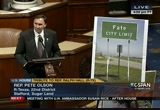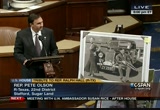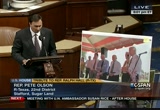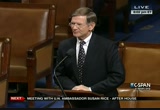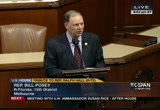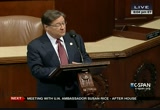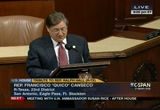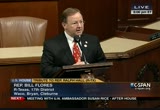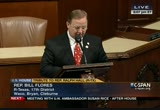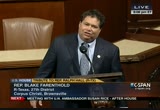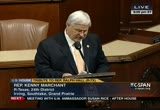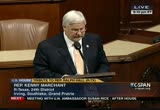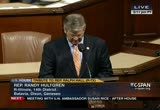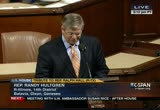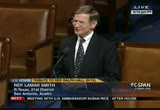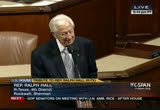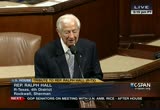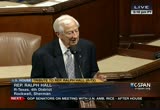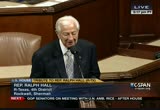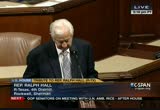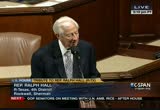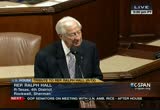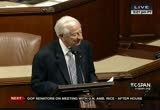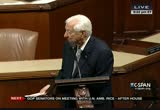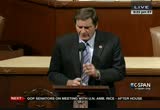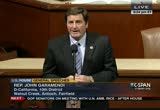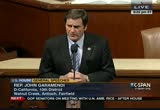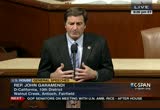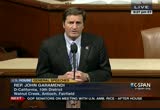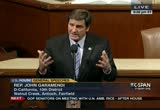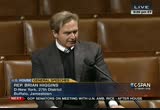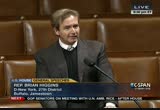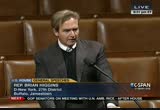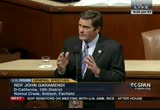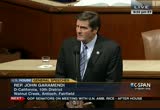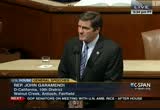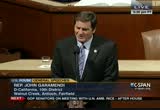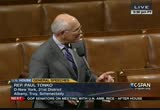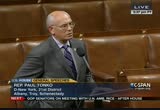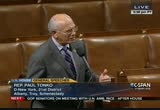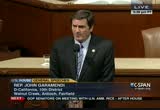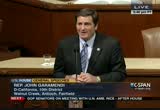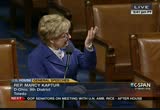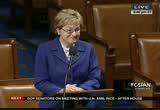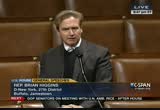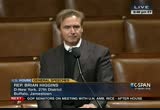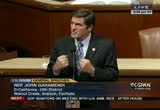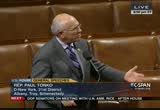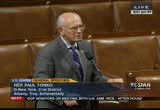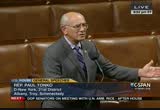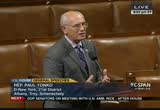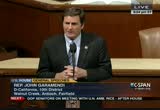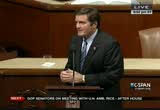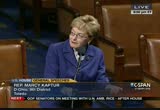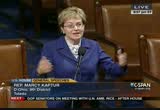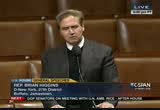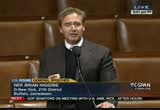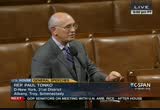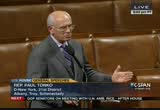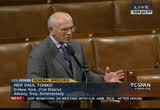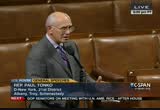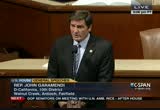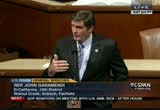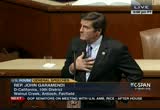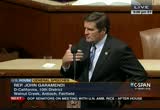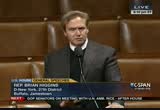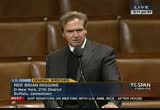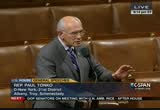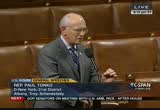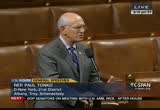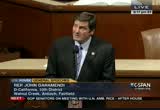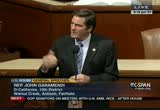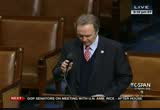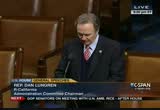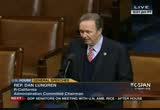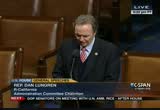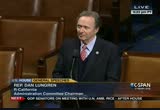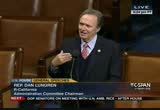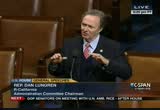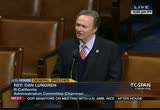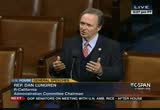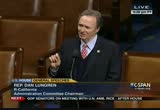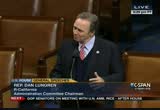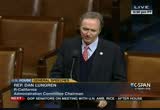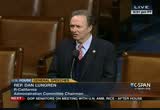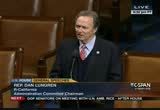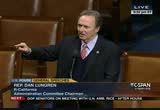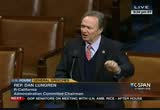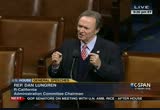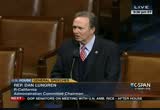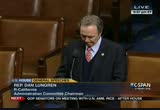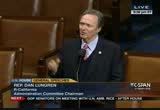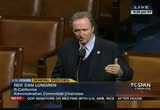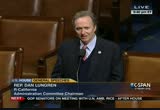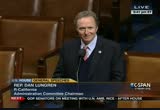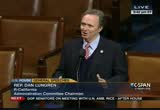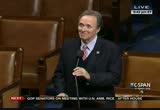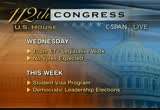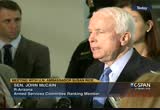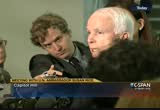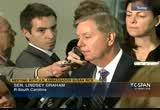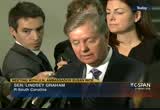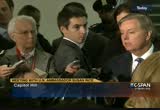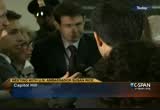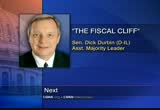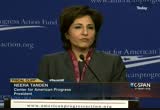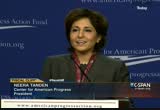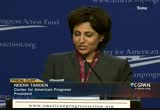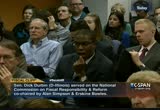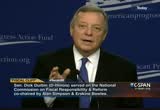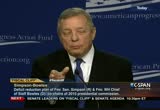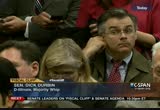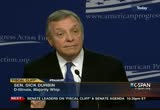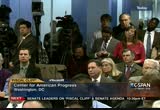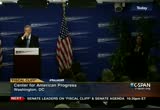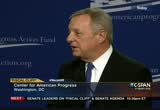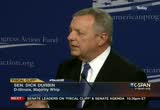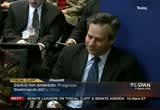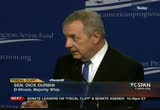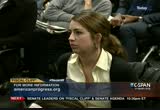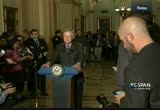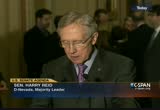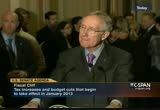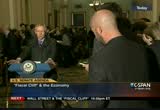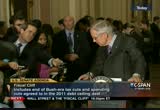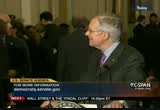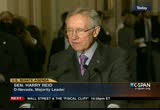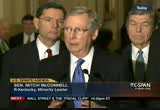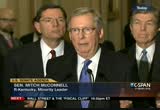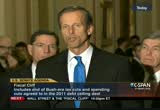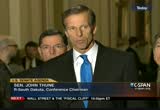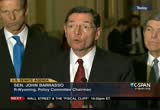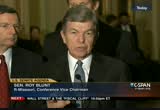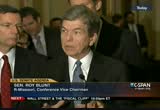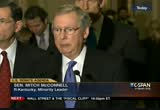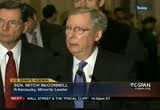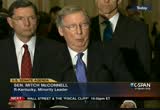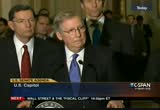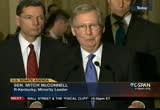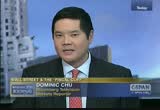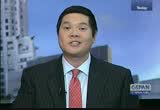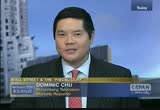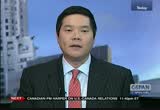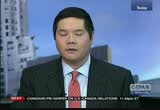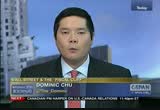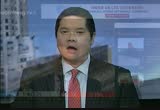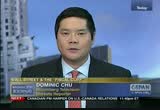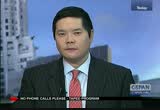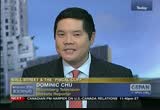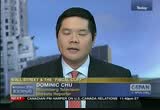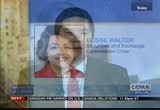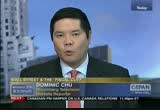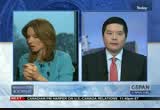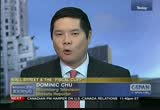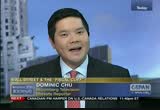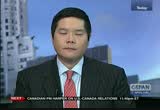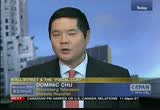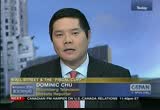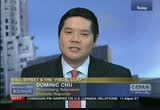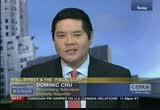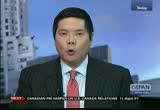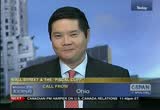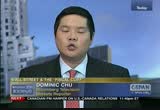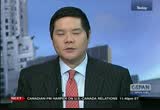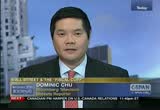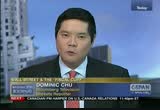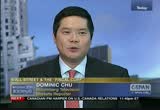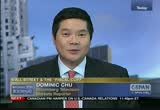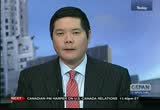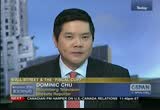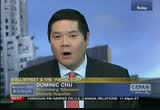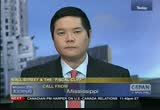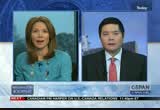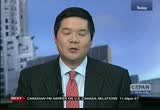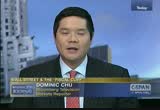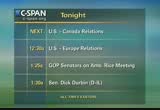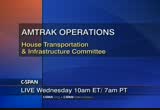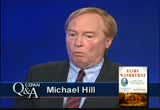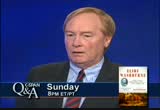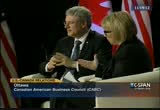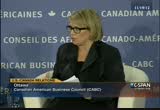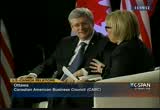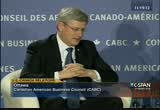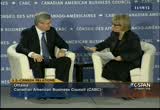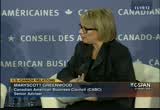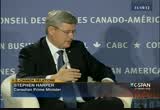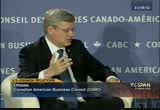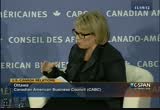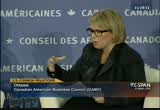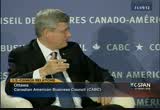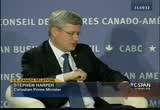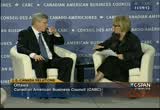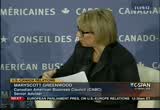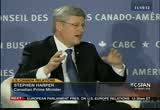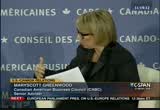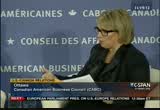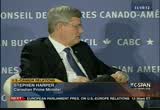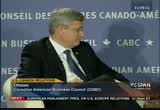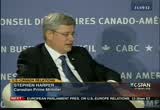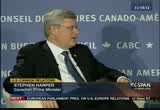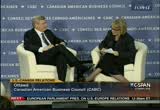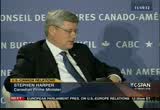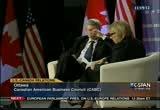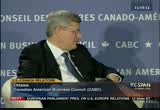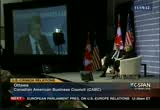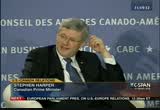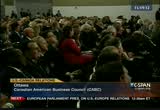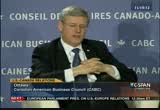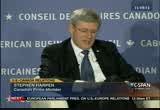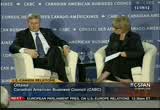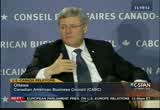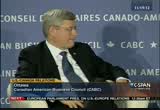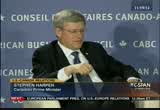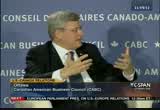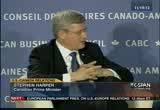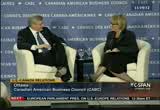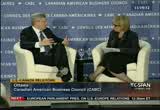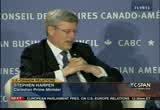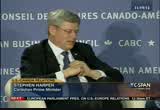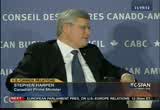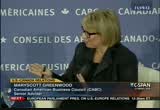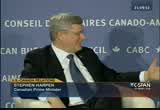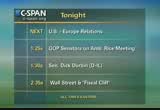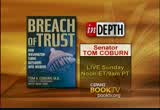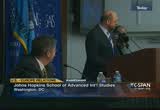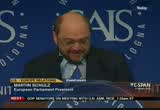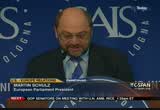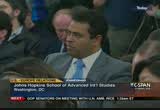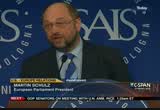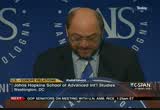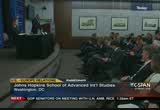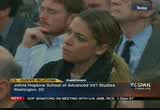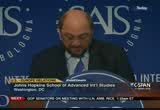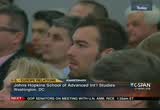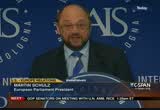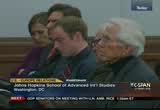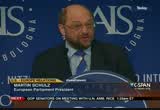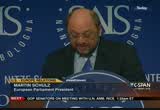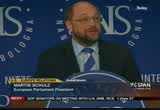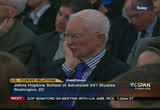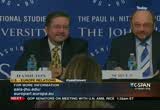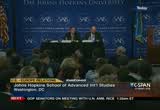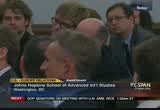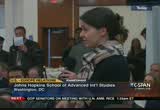tv Capitol Hill Hearings CSPAN November 27, 2012 8:00pm-1:00am EST
8:00 pm
of money. and he went to the service station to tell the boss what had happened about the tip, he glanced at the newspaper and he froze. he had just serviced the car, the two occupant offings which were pictured on the front page of the newspaper, bonnie and clyde. notorious gangsters who met their demise shortly after leaving rock wall, texas. ralph pumped gas for bonnie and clyde. but ralph has had other amazing brushes with history. he's also made history. as a county judge, a state legislator, united states congressman, ralph made our
8:01 pm
country stronger and made the world better. i've had the privilege to work with chairman hall for nearly four years to ensure america obtained human space flight. the budget of 2010 threatened to stop that, he used all his tools of public service to help him win the battle. here are a couple of those tools he had, neil armstrong, tom stafford, part of a bipartisan coalition to put the united
8:02 pm
states on a path to go into orbit. as a boy who grew up within a mile and a half of the johnson space center, i saw ralph hall make history, that my kids, your kids, can see americans go into space. one more slide. we've all talked about the children earlier this year, because you did that, my kid said, dad, let's jump out of a plane when i turn 18. thank you, mr. chairman, you made a difference in my life and
8:03 pm
a difference to so many people. mr. smith: i yield two minutes to the gentleman from florida, bill posey. mr. posey: thank you, mr. chairman. i appreciate the opportunity to join with me colleagues in recognizing chairman ralph hall for his tenure as chairman of the house science committee. during his service, he reached acrong the -- across the aisle and forged bipartisan coalitions to support important legislation and no program, in my view, has benefited more if his bipartisan commitment than the united states space program. representative hall has been an especially strong voice for our nation's human space flight program which has benefited not only tbs and florida but propoled our nation on the path of unprecedented scientific and technological advancement.
8:04 pm
we can all learn a lot from our colleagues. congressman hall leads by example. he's well known for calling a spade a spade. his word truly is his bond and you can always take that to the bank. advancing our nation's human space flight program has been a hallmark for chairman hall. as we look out at america's next general riggs of explorers, space is their destiny and he'll help ensure that they reach it. ralph, there's a lot of work to do and i'm truly honored by the opportunity to serve with you an get it done. i only hope and pray when i'm 65 years old that bill in half as good shape or half as active as you. mr. smith: i yield to minutes to the gentleman from texas, quico canseco. mr. canseco: i thank my friend and colleague for yielding to
8:05 pm
me. i rise to honor a great man, a great texan, and a great american, ralph hall. as he makes history today for being the most experienced member in lifelong years of this chamber to cast a vote, eem proud, as a member of the texas delegation, to call him a friend and a clige. -- and a colleague. ralph hall embodies so many of the virtues we celebrate as americans. he is a man who was forever devoted to his family. he's a patriot who served his country during world war ii. he is a public servant who has dedicated his life to serving the people of texas and the united states. he is an example to all americans. not just for his service to family and country but in the graceful manner in which he goes about his tasks and the joy that he inspires in all of us. this chamber will always be grateful for the service that ralph hall has fwiven to the house of representatives and to
8:06 pm
the nation. we all enjoy his good humor, his dedication, his love of country that brings to -- that he brengs to his job each and every day. tonight, as we pay tribute to ralph hall and wish him many more years of service@people of texas and the united states, i thank him for the privilege of serving by his side as a friend and a colleague in the house of representatives of the united states congress. i yield back. mr. smith: i yield two minutes to the gentleman from texas, bill flores. mr. flores: i thank chairman smith for yielding. mr. speaker, i rise today to honor one of my texas colleagues who has just become the oldest known member of the house of representatives to cast a railroaded -- a recorded vote on the house floor. i congratulate congressman ralph
8:07 pm
hall for passing this historic milestone. he was first elected back in 19 0 and is preparing to enter his 17th term when the 13th congress convenes next year he currently serbs as chairman of the science, space and technology committee. he is the longest serving member of the committee and the first member to serve as a ranking member as both a republican and a democrat. now everybody know what is a comedian that ralph is and i want to share a funny story with you about him. at his birthday party in may of 2011, i was asked to say a few words about him. so i talked for a few minutes about him and about what it was like to serve with him and i ended by saying that i hoped to wrap up my time in congress in just three to four terms and would never aspire to serve as long as he is. to which ralph dryly replied, well, bill, we're going to miss you. he adds levity to every situation. mr. speaker, it's an han nor to
8:08 pm
work alongside ralph. i look forward to serving with him in the future and to addressing the many pressing needs of the american people. thank you and i yield back. the speaker pro tempore: mr. speaker, i yield two minutes to the gentleman from texas, blake farenthold. -- mr. smith: i yield two minutes to the gentleman from texas, blake frarntehold. mr. farenthold: i'm honored to be here today as well paying my respects and tribute to congressman ralph hall. as a freshman in congress there's a lot to learn. when i came in, ralph hall was one of those people who was larger than life and he remains larger than life after i've been here two years. he's the kind of guy you aspire to be in congress. able to solve problems, able to get things done across party lines. friends with everybody, always a smile on his face, always a joke on his lips. he is the problem solver and that's what we need here in washington is people who san francisco problems. a perfect example that you've
8:09 pm
heard some of my colleagues alewd to earlier today, they're saying ralph -- there are folks saying, ralph hall is too old to serve in congress he solved that problem by jumping out of a -- an airplane. a naval pilot does not want to jump out of a perfectly good airplane. anyway, ralph hall epitomizes and is the perfect example of what it is to to be a congressman he would make friends with a fence post. as i told my wife den bee, when i grow up, i want to be ralph hall. i yield back. mr. smith: mr. speaker, i yield two minutes to the gentleman from texas, kenny marchant. mr. merchant: mr. speaker, -- mr. marchant: mr. speaker, today we honor our friend and colleague ralph hall, for being the oldest member to cast a vote in the history of the house of representatives.
8:10 pm
i've the privilege of knowing ralph for decades, he's a dear friend and a tireless advocate for the people of the fourth district of our home state. his service to the country didn't start with his election to congress in 1980 but started long before. he answered the country's call to serb in the service in world war ii, serving in the navy as an aircraft carrier pilot from 1942 to 1945, later in his life, he served in the texas legislature from 196 to 1978. ralph, i -- to 1972. ralph, i did not have the opportunity to serve with you in the texas leng slayture, we were there at different times but you served with honor and served as senate pro tem for two years. though ralph's time in the texas legislature predated me, he was and always will be a legend in austin, texas. today my friend continues to distinguish himself in congress serving as chairman of the
8:11 pm
science, space, and techling in committee. there never has been anyone quite like ralph before. he is a true texan, a true texan hero, and i am proud to call him my friend. though he qualified for retirement a couple of decades ago, he still serves his country and constituents with honor and distinction. mr. smith: i yield two minutes to the gentleman from illinois, randy cochran. mr. cochrane: it is my honor to rise today to pay tribute to ralph hall who i have come to know not only as a -- mr. hultgren: it is my honor to rise today to pay tribute to ralph hall who i have come to know not only as a member of the committee but as a dear friend. it's eth that his personal experience and expertise has carried over into a passion for
8:12 pm
american preeminence in flight and aviation. as you have heard, ralph will become the old gs known house member to cast a recorded floor vote. this is an opportunity to reflect on his record of service to the nation. he has served not only here in washington but also in his home state of texas as a member of their legislature, and a a veteran of the second world war. congressman hall's wit, humor, and bipartisanship are attributes sorely needed today more than ever. i feel privevedged to serve with him in my first term in congress, hear his stories and knowledge spanning nine decades and to count him as friend. i realize more than ever that someone who is 91 wreers old can say a lot of things that someone who is 46 years old would get in trouble for.
8:13 pm
i enjoy hearing you speak and love your jokes. he's the living embodyment of southern hospitality and good heartedness. mr. chairman, thank you for your service and congratulations on this wonderful milestone. i know we're going to see you continue to set records for years to come. i yield back, thank you. mr. smith: mr. speaker, the time has come to recognize the man we have been honoring here tonight. earlier this evening, congressman hall set the record, broke the record, for the oldest member of congress to have ever cast a vote in the united states house of representatives. but actually, mr. speaker, every day, ralph hall sets a record for his service to our country. mr. speaker, the time of the special order is going to appear to expire in about five minutes and i hope the speaker might
8:14 pm
consider wielding a gentle gavel. with that, i look forward to hearing from the gentleman from texas, the gentleman from rock wall, texas, himself, ralph hall. -- from rock, texas, himself, ralph hall. -- from rockwall, texas, himself, ralph hall. mr. hall: i don't really want to make a speech, i've enjoyed the speeches i've listened to here, a lot of it was true. good people, great guys that i work with, guys and fwals, honored to get to be part of it. for the past 32 years i have been here, i really came up here to stay four years. that's what my wife and i agreed on. i just didn't say which four i was talking about. but she was always wanted to encourage me to run because i was a son who is a district
8:15 pm
judge and i think she felt that me being in congress would help that son. mama's always love their -- mamas always love their little cubs. i think he was helping me, he was running on a republican ticket and i was running on a democrat ticket. we love to talk i had a race that started this last time which 78% of the votes it looked like. the gentleman from houston spent $450,000 against me. he didn't know me. didn't know the two people who were running against me. but spent that amount of money. to defeat me for some reason. because he thought i was too old to be here. he picked fief of us and the other four didn't take him on. i tried to take him on some. but in taking him on i had to assure my people that i wasn't the old goot that he was saying i was, that i was capable of
8:16 pm
the work. and the only way i could think of that, i run a couple of miles every morning. when i was running i looked up and there was an airplane up there. and i thought, if i could jump up and touch that airplane they'd think i was agile enough maybe to keep on being mayor in congressman. -- being their congressman. i had to do something so i decided if i run two miles, if i jump two miles, maybe that would be it. so we got in an airplane, got this guy and he really was great. he trained me and showed me how to get in and out. of course i'd flown probably a couple of, 300 or 400 hours during the war, but i had made one jump during the war but it wasn't a forced jump. so i knew what it was. and i knew it was ok. but i also knew it would tell people that i had not had a stroke and that's what they were putting out, but that i was able and capable of representing them. they had to know that, they were entitled to know that. so i decided i'd jump out of that airplane.
8:17 pm
we got there, got right over the opening there and i looked down, had maybe a couple hundred people on the ground waiting there and he said, as you jump out, reach with your heel and kick me in the rear. and i was glad to do that. i almost decided not to jump but i was too close and i knew i had to. i might have been pushed a little. i don't even know. i did jump and he held on to me so tight, there were two of us there. he was holding tight and that kind of struck me and i turned around and asked him, do you mean it? he said, what do you mean? i said, you're holding me so tight. do you care for me? is that what's the deal? there's a preacher down there and the president said a man can marry a man, maybe he'll marry us when we get there. he said, shut up, the ground's going to be here in just a few minutes but it was a pretty thing to see the earth coming up to us there. and seeing good friends down there that were waiting for me.
8:18 pm
even my undertaker was there. my undertaker meets me every time i go home with a tape measure and tells me he has one in store for me. and he also tells me, don't worry about flures, don't worry about flowers, if you don't like them they'll finally grow on you. kind of a smart alec way to do it but he's my close friend, was an intern when i was in the texas senate. and one of the fine leaders of rockwall. for the past 32 years i've had the honor and the privilege of representing the fourth district of texas here in congress. i think it's just an honor to know that the -- there have been 10,4 4 men and women elected to serve, that i may be the oldest to ever serve. or to ever vote on the floor. there's others who have been here but didn't vote. i think that date comes up sometimes around the 21st day of december. but my first impression of
8:19 pm
house representatives when i got here began with speaker sam rayburn whose district i represent. his wife and my wife were good friends during college. that's what college name was before it was east texas state teachers college. and when i was in the senate i changed it to east texas state university. and my wife graduated from there, had the privilege of handing her a paloma. those are good things and that's a great institution over there. mr. rayburn was called by my mother who had known him back in the earlier days and was at mayo college with him, to give he some kind of a recommendation to be an officer in the army or the navy or marine corps, or something. he didn't call her back, he didn't write her a letter backest. came to the breakfast table to tell her, i can't appoint that boy to anything. there's four reasons.
8:20 pm
she said, what on earth can that be? he said, all four are his grades and that was kind of true because i always thought everything over 70 was wasted. not a good student. not a good football player. we lost our car early in the depression. one guy in the depression said he'd eaten so many rabbits he was afraid of his own dog. we didn't have that kind of problem but we knew what the depression was. and i fear for this country right today, if we don't get together and maybe forget we're more republican than we are democrat and more democrat than we are republican, where our children are going to suffer. we need make a move and think of them. we owe our children opportunity and effort. it's just that simple. i think we're going to have some give, we're all going to get together and try to work something out. we have a good speaker, a guy i admire and respect, a kind
8:21 pm
speaker. a guy that means what he says and a speaker that cares about us. i don't degree with everything he says but we need to forget the pettiness we have. get behind the leadership here and try to write some legislation that's for our children and for our children's children. that's the most important thing i think we can do. i know my time's about up. mr. smith: mr. speaker, would it be appropriate to ask unanimous consent that the gentleman from texas have an additional five minutes? or more? the speaker pro tempore: the chair cannot entertain that request. the gentleman's time has expired. does the gentleman from texas wish to address the house for one minute? mr. hall: thank you very much. i appreciate and i understand what the rules are and i thank my folks for being quiet up there when i know they want to be heard. god bless this speaker, god bless you, lamar smith, you make a good chairman of science, space and technology.
8:22 pm
and i yield back the time i don't have. the speaker pro tempore: the gentleman yields back. under the speaker's announced policy of january 5, 2011, the gentleman from california, mr. garamendi, is recognized for 60 minutes as the designee of the minority leader. mr. garamendi: mr. speaker, if mr. hall would like to finish his statement, i'd be happy to yield five minutes to mr. hall. mr. hall: i thank the gentleman. i think i've said about -- you are a gentleman, you are my friend, and i appreciate you. i just think we need to get together and remember the most important part of all of us is our children and our children's future. and that's what we all get together and -- that's the reason for us to change some of the positions we've taken in the past, to try to work something out that the american people expect. you're a gentleman to offer me that. maybe i've used part that have
8:23 pm
five minutes but thank you very much. and these folks need to go home sometime tonight. mr. garamendi: you had a lot of people speaking to your extraordinary career here and i didn't want to cut it short. but your advice is sound and hopefully taken by all of us. mr. hall: my mother always told me to be silent and be thoughtful rather than to open my mouth and remove all doubt. i don't want to get to talking too much. it's been too good tonight. all of these people have said things, i car for -- care for them, i care for this institution, i care for poem on a on both sides of this docket. i'm honored to be a part. thank you and god bless this country. mr. garamendi: thank you, mr. hall. apparently a lot of people would agree with your extraordinary career and the work that you've done here in congress over these many, many years. and decades. part of what you've spent a
8:24 pm
good deal of your career working on, mr. hall, has been the improvement of the american economy. and tonight i'd like to join a couple of my colleagues on the democratic side to talk about the economy and specifically to talk about jobs and the things that we can do here in the a winning days of this congress -- wanning days of this congress to create some job opportunities. we've got some very heavy lifting here in congress in the next month and a half. everybody wants to talk about the fiscal cliff, some talk about austerity, bomb, others talk about what needs to be done to lift the debt limit. and all of these issues are before us. tax increases are not. but underlying all of that, foundational to all of that, is putting america back to work. getting americans back into their jobs. if we do that we will clearly increase employment and when
8:25 pm
you increase employment you always increase tax revenue to the federal government, to state governments and local governments. so our principle task as i see it and i think i'm joined by many of my colleagues, both democratic and republican, is to get the american economy going. to put it back in gear. and there are many reasons beyond just employment and the opportunities that family have -- families have to make it. one of the critical elements in all of this is to protect americans. we recently saw superstorm san joaquin smash into -- sandy smash into new jersey and new york with devastating results. loss of life, incredible loss of property, both public and private, and a very, very big cleanup bill. joining me in a little while will be some of our representatives from the state
8:26 pm
of new york. and they'll talk about that in detail. but before sandy ever hit the coast there was a need here in america to protect americans from storms and floods. we know what happens when the protection wasn't there. devastating results. today in the news in california, northern california , there is on the headlines a series of storms coming into northern california, into my district, into where my home is, and the word is, get ready for serious flooding. i mean, this is very early in the season. although californians with any memory at all will know that there are a series of infamous christmas floods in northern california. now, this is really a thanksgiving flood potential. but nonetheless it's there. and i will tell you clearly
8:27 pm
that the sacramento region, which is the second most risky region in the nation for flooding, and flood damage, is right at the center of this storm. so that's the city of sacramento. perhaps 100,000 or more people in serious gemdy. should a levee break and those levees are not up to 200-year standards, should a levee break in that region, people would have less than 20 minutes to find high ground to get out. an impossible situation. so we need serious infrastructure impro. and that's sacramento. the rest of my new district goes further north into marysville and yuba city, along the sacramento river, further north, and along the yuba river. again, communities at high risk. serious infrastructure need to be developed. levees need to be improved.
8:28 pm
upgrade -- upgraded, enhanced. otherwise citizens are at risk just like they were in staten island. this is our responsibility. this is not only a local responsibility and a state responsibility, this is a national responsibility. this is where we become a national community. looking out for each other. providing the basic infrastructure to protect us. we also have infrastructure that's necessary for commerce. our roads, our highways, our internet systems, our rail transportation systems, all of these infrastructure items are critical to the economic well-being of america in addition to the human and commerce safety of this nation. we're going to talk about that tonight. joining me is my colleague from new york who has been working on this issue for some time, he has a project and a program
8:29 pm
that he's proposing, one that caught my attention, i'd asked him to come and join us and being from the state of new york, we're talking about something that's very, very real for you. please, tell us what this is all about. >> i want to thank my colleague from california and for his leadership on the infrastructure issue. i think the problem that we see here in washington is that the discussion is focused on the wrong thing. mr. higgins: when you have a recess, an economic contraction, what your objective needs to be in terms of public policy is growth. growth in the economy. and what we're experiencing now is anemic growth. for example, our growth rate is at about 2% or less. that current rate of growth is not enough to sustain the current level of employment. so in other words if we don't grow this economy our unemployment rate will necessarily go up.
8:30 pm
we talk about debt and deficit in this chamber, if we remember less than 12 years ago, 12 years ago we hit a budgetary surplus of $258 billion. meaning that we were taking in $258 billion more in each year than we were spending. how was that possible? it was made possible by having created 22 million private sector jobs in the previous eight years. . what was the policy then? the policy was to invest in the american economy, in the american people, in education, in scientific research, and infrastructure. so i think the lessons from our most recent past are very instructive today as to what we should be doing in washington to promote growth. the gentleman from california spoke of a plan i was working on, that's a $1.2 trillion
8:31 pm
investment in rebuilding the roads and bridges of america. that plan, advanced by the new america foundation, would create 27 million private sector jobs in five years. the first year alone, over five million jobs which would reduce the current employment rate from where it is today to 6.4% and in the second year, 5.2%. now public infrastructure, as we know, is a public responsibility. it's never a question as to whether or not we are going to rebuild our roads and bridges. the question is when does it make most sense to undertake that responsibility? and i would submit to you that the time to do it is now. money is cheaper than it's ever going to be. equipment is cheaper because it's -- and employment is cheap
8:32 pm
because of the unemployment rate. we need to consider, we spent as a nation $180 billion rebuilding the roads and bridges of afghanistan. we spent $67 billion rebuilding the roads and bridges of iraq. nations of 30 million and 26 million respectively. for this nation, for america, a population of over 300 million people, the american society of civil energies put the quality of you are infrastructure as a d, when we're ranked 24th in overall quality in the world when in 2001 we were number two, we're going to spend less than $53 billion. that's not only weak, it's pathetically weak. mr. garamendi: mr. higgins, thank you so very, very much for bringing this issue in stark terms to our attention. you caught me my attention earlier when we were talking about this, but here on the floor, this is a $1,200 billion
8:33 pm
program that could create 27 million jobs in the next five years? and those are economic analysis that's been done by the new america foundation? mr. higgins: it has. mr. garamendi: and how do we pay for this again? mr. higgins you spay for it as you pay for transportation improvements at the local, state and federal level. you issue debt to finance the life of the project. mr. gare men tee: the same way we build and own our homes, we borrow money to build that personal infrastructure, our home. mr. -- mr. higgins: that's right. mr. garamendi: the borrowing rate on a 12-year note is 1%? many higgins: one-half of one percent. mr. gir men tee: it's virtually
8:34 pm
free money. it does run up the debt but we're using the money to create infrastructure a necessary investment for the economy to grow. and to protect ourselves. mr. higgins: that's right. and according to transportation for america, there are 69,000 structurally deficient bridges in the united states. there are over 2,000 structurally deficient bridges in new york state. there are 99 structurally deficient bridges in my mustn't of western new york. every second of every day, seven cars drive on a bridge in this nation that is structurally deficient. mr. garamendi: we saw what collapse can do in the minnesota-wisconsin bridge and the loss of life. we saw what inadequate infrastructure protecting new jersey and new york can do with extraordinary loss of public investment as well as private
8:35 pm
investment and lives. joining us for this discussion on jobs and creating jobs is part of what we like to call the east coast-west coast team, congressman paul tonko, you and i are often here on the floor to talk about how we can grow the american economy in a bipartisan way. this infrastructure notion that mr. higgins has brought to us i think has considerable merit and fits, i think, very nicely with what president obama has recommended in his american jobs act which was an immediate $50 billion enhancement of the $60 billion that we would otherwise spend, bringing the total to over $100 billion in the coming year. again, enormous infrastructure. mr. tonko, i know you're on this issue, we've spent time talking
8:36 pm
about it in the past. why don't you get on it and share with us your thoughts. mr. tonko: sure. representative garamendi, thank you for bringing us together for an hour of important discussion. infrastructure is a very sound investment. it's an honor to serb in the new york delegation with representative higgins who served, i served with him in the new york state legislature, i was seated in that committee in 1987, in the shadow of a collapse of a new york state bridge where 10 people perish. we recently commemorated the 25th anniversary of that event. very tragic. it was heart of my home county a small county of 50,000 people, montgomery county, new york. and the impact, economically,
8:37 pm
that that devastating occurrence brought to bear was incalculable. when you talk about, i listened with interest, with the exchange that you and representative higgins had about how do you pay for it. the one way you don't want to pay for it is through an impact on the economy of your local region. the commerce hit that was taken was severe. the loss of dollars to the community was, you know, just incomprehensible. and of course the loss of lives which surpasses anything in importance. interestingly, many of the individuals who were on that victims' list were not from the region. we're all impacted by weak infrastructure no matter in which state that might be. you never know when you're traveling over a situation that is unsafe. so i think it is a wise investment to go forward and put
8:38 pm
to work tens of millions of skilled laborers who can make a difference in public safety in our communities, making certain that the soundness of investment and improvement, absolutely essential for our quality of life, for our public safety, for the strengthening of our commerce and we know that infrastructure improvements, you and i have talked in the past about the infrastructure bank bill, we talked about ways of leveraging dollars to weaken the impact on the public sector, on the taxpayer, there are ways to do that in very strident term that allow us to go forward with the commitment, with the investment that is required. certainly with the age and infrastructure of this country, if we can build other nations and thank goodness that we have helped people strengthen their situation for their own people, but my gosh, we should take advice, our own advice here and
8:39 pm
understand that there's a strong bit of economic growth that occurs when you strengthen your infrastructure from traditional roads and bridges to rail, to mune cases, and to the bridge system, the bridge system -- -- and to the grid. the grid system has had several tests, now being used to send electrons from region to region, state to state, so there's a huge amount of involvement that beg ours investment. i think for sound reasons, for safety reasons, and for economic recovery purposes, it makes sense and let's put the people to work and build a stronger community. mr. garamendi: thank you very much, mr. ton owe. -- tonko. your personal experience in the new york legislature and your
8:40 pm
own community bring this is issue into focus here on the floor of he house. as we build this infrastructure, if we add one additional element to the creation of the infrastructure, something that again we've talked about here many times, that is that we use our money, our taxpayer money, whether it's borrowed or direct payment, that we use that money to buy american made equipment. so that the steel that goes into the bridges is american made. the cement is made in america. manufactured in america. that we use that american money on american made equipment. in other words, make it in america. so we not only are doing the infrastructure and the jobs that come with it but we also use that to revitalize our manufacturing sector. this is a very powerful way in which we can more rapidly expand the american economy. i just happen to have two bills that would do that, one for the
8:41 pm
clean energy industry if we're going to use our taxpayer money to subsidize the clean energy industry, wonderful. we need to do that for all kinds of reasons, but buy american made clean energy products, whether it's a solar system or a wind turbine. and similarly with regard to transportation. the train the buses, the steel, let's buy that in america, american manufacturing. i noticed a lovely lady joining us from the state of ohio, marcy kaptur. you've talked about these issues many time, thank you for joining us this evening. ms. kaptur: congressman gare men doe, i want to say i'm privileged to join such three dedicated members who -- whose states have been wise enough to send them here to washington. obviously, congressman garamendi from northern california, and congressman tonko from the state of new york, the great state of new york and congressman higgins also of the state of new york, a
8:42 pm
little lit upstate. mr. garamendi: he's almost as associated with ohio as new york. isn't he on the border out there somewhere? ms. kaptur: there's the st. lawrence seaway that connects it all as it flows into the atlantic ocean. but many of us have come through very difficult campaigns in this political brother of 2012. but what is wonderful about serving with the three of you is you keep the focus on jobs in this country and the importance of making goods in america and where wealth is really created. how we do that as a country. and what it takes to build a great country. i look at the st. lawrence seaway and i think about dwight eisenhower, a great general, led our forces in europe, and came
8:43 pm
home and decided that america needed to create the st. lawrence seaway so that we would unlock the potential of the upper great lakes and lower great lakes and you say to yourself today, with some of the limited thinking that some exhibit, of course no one in this chamber would ever be accused of that, right? but could we do the st. lawrence seaway again? i had the great privilege of traveling out west and i think i have probably been in every state, almost every congressional district at one point in my career. to look at the hoover dam and as i admired the dam and i thought to myself, america has it in her to land a man on the moon and to create nasa, but here at home, our public works, do we have the vision? do we have a vision big enough today in the 21st century to
8:44 pm
match with those who came before -- what those who came before us gave to us to put this continent together? as i travel, i see water systems in disrepair. in fact, in my hometown of toledo, they're trying to find $45 million to put a roof on the water treatment plant which really needs $500 million to fix. i go to the new parts of the ninth district in the city of cleveland and i look at the need for infrastructure repair. and in the same city, so many unemployed people. who could be put to work fixing the heart and soul of cleveland. and the number of brown fields that are there where we're waiting to clear property to clean it up, move the sewage treatment plants, move other assets that are there, and create a much greater port on
8:45 pm
lake erie. i think, do we have it in us? i know i have it in me to want to do this but i look at our heritage, the interstate highway system itself. again, during the 1950's. if we think about what was done, there was a time when this country, if you moved from -- you couldn't move from ohio to california. on roads that interconnected. people think that just happened. but it didn't. it took real vision to do that. . when we invest in infrastructure, that is the most job-rich program that think country could ever promote and to create efficiencies and intermodal connections, congressman tonko talked about fiber optics and about telecommunications and all of the new ways of connecting our country. i've had the privilege in my career of representing many rural areas that have short, not just on doctors, but on
8:46 pm
telecommunications capabilities. it isn't just in the heart of ukraine where people can't communicate. it's in rural america as well. and so i just came down here, i heard you speaking and i thought, i identify with your cause. thank you for talking about jobs inside the congress of the united states. thank you, congressman garamendi, congressman higgins, congressman tonko, now, you all come from what is regarded as the coasts, right? but i'm from a coast too. the north coast, along lake erie and it's actually quite a long coast when you take a look at it and you unwind it and all of the various lakes. so we're coastal america, too, and i identify with your cause and believe me the people that sent me here identify with the cause of jobs and economic growth and infrastructure investment in our country, to push us far beyond where perhaps roosevelt and eisenhower and kennedy dreamed. thank you so very much for this special order tonight.
8:47 pm
mr. garamendi: how correct you are to look back to those heroes of the past that laid down the infrastructure. you can actually go back a little bit further, george washington in his first year as president of the united states instructed alexander hamilton to develop an industrial policy . one part of that industrial policy was the development of the infrastructure for america's commerce and it was canals and it was ports and it was roads. mr. higgins, so how are we going to make this happen? you got $1.2 trillion you want to put out there. mr. higgins: well, i think you made a very good point, particularly with your leadership on the make it in america initiative. keep in mind when you invest there american infrastructure, you're buying labor from american businesses. you're buying supplies and material from american businesses. you're buying engineering and design services from american businesses. and we also forgot a very important element of our economy.
8:48 pm
it's the million -- it's the thousands of returning veterans who have been serving our country in iraq and afghanistan. the unemployment rate, the unemployment rate today for those returning veterans under the age of 24 is 19%. there was a program started by the department of defense, it's now a not for profit called helmets to hard hats. and what it basically does, it identifies 60,000 american businesses and some of the trade unions. they collaborate to get together, to identify veterans who have already had extraordinary training and discipline and leadership and teamwork and it accelerates the apprenticeship program. so these individuals could be making $60,000, $70,000 a year if there was work to be had here. so it's an investment in america, it's an investment in american businesses, and it says to our returning veterans in a real sincere and genuine way, thank you for your
8:49 pm
service. mr. garamendi: you said earlier that the american society of engineers, i think that was the name, said that we have a d rating for infrastructure and that we need over $2 trillion. i don't know anybody in my district where we may have a serious flood in the next three days that says the infrastructure is adequate. they're look at those levinees and they're watching the water rise and they're saying, this isn't sufficient to protect us. so in a very real sense of just safety, infrastructure is needed. but also it's needed for employment. you correctly raised the issue of the veterans coming back. $2 trillion. there is no doubt about the need. america knows there's a need. as the four of us have discussed here. there is a need, even a crying need, and a human safety need
8:50 pm
right now. not tomorrow, not 10 years from now. but immediately. the question is how do we go about making that happen? and here, 435 of us and 100 senators on the other side of this building have the ability to answer the need, the crying need of america to build our infrastructure, to give us the jobs, to provide the foundation for economic growth, and to protect us. we have that power. let's continue our discussion, mr. tonko. mr. tonko: representative kaptur made an interesting point, that there was a essential of vision when they pursued the efforts of the st. lawrence seaway. there was a sense of vision in my district as a donor area and in representative higgins' when representative clinton perceived this eerie canal as way to transport goods and to open up the westward movement,
8:51 pm
to spark an industrial revolution. that gave birth, not only to a ports called new york city, but a berth to a necklass of communities called milltowns that became the encenters of invention and innovation. so it's that spark of vision that is the first step. and if we're going to denounce any of these creative opportunities to invest in nation building by denouncing it as socialism, you know, it was president -- was president eisenhower a socialist? were all those who preceded him or followed him who came up with these great visions, a space program that gave us an unleashing of technology, no, they were thinkers. they were visionaries. they were leaders. and that's the first step. and then we develop policy from that vision. we teggetter it into real terms. and then we invest in the implementation of that policy. that's america at her finest.
8:52 pm
and if we look back at the erie canal history, when they did that it wasn't easy times. they were tough times. they were tough economic times. and so they stepped up to the plate and said, we're going to do this, it's not easy to launch but we're going to do it because it's the way through the tough times. we have tough times now. chronically high unemployment. that for many preceded the recession. they need opportunity. our economy growth when we invest in those workers of whom representative higgins spoke, in those materials in goods that allow for our nation's businesses to prosper. add jobs. become part of a recovery. so that is all very critical. i talked earlier about the bridge collapse that spans a creek in upstate new york, that you can walk across in the
8:53 pm
summertime. it was flowing equal to the efforts, the c.f.s., of niagara falls. so there are some economic impacts coming from mother nature. that are driven by global warming, climate change. so when we do some of these visionary things, incorporate all of the policies so that environmental concerns, as policy formats, with economic recovery terms, with energy terms, with transportation, can all be woven together and you solve some of our ills, where we're being impacted by mother nature, with natural disasters, that are draining our infrastructure as we witness with sandy, all along the east coast. where now billions, tens of blingbls of dollars of recovery are require -- billions of dollars of recovery are required. let's reduce the threats from mother nature, build our economy by adding jobs and providing for public safety,
8:54 pm
and creating a state-of-the-art economy driven by transportation, communications, energy transformation, with renewables and the like that will cut down on the emission of particles and dangerous substances that are toxic to the ozone layer. that's america at her finest. and if we do that, simple thing of providing vision, followed with policy, followed with resource advocacy, we will have achieved and our brightest, best days lie ahead. not denouncing that thinking as socialist. mr. garamendi: there's a critical moment now, right now. that moment is seen in the deliberations that are going on here in this hall, in the capitol, about the fiscal cliff, about the deficit. and there are those who would suggest that the only way to
8:55 pm
deal with it is with an austerity program. reduce government expenditures at every level. there's some evidence cited by mr. higgins earlier that there's another way of dealing with this. and that is to put people to work. to use the power of government to put people to work. even if that means borrowing money at 1%, putting it into an infrastructure bank to finance projects that have a cash flow, such as your sanitation facility in toledo, ohio, or a toll road or the st. lawrence seaway, all of which have a cash flow. you could maybe charge a percent and a half. you borrow at 1%, you charge 1.5%, and we build. we put people to work. ms. kaptur, why don't you pick this up and then, mr. higgins, and we'll capry on our
8:56 pm
conversation. ms. kaptur: i thank you, congressman garamendi, and i am really listening carefully to what congressman tonko and congressman higgins have been saying this evening in thinking about what's going on in ohio. the northern band of ohio from toledo through cleveland. and the importance of manufacturing. and thinking about how hard our businesses and our workers have to compete in a very unlevel, global playingfield. and i've seen this directly in the automotive industry. where our -- to this day, one of the reasons that our automotive industry had difficulty and why it required the nation to not let it fail and to pay back what was borrowed was because we are in competition with state-managed economies. in asia, for example, we have countries that actually, one of them, i remember the china commission, and several economists testified before our
8:57 pm
committee a few years ago, that you really have an operation as market leninism. i said, describe to me what you're seeing. i have companies in my district who have business deals in china that have lost millions of dollars. they've paid for goods that have never been received. in a transparent legal system like our own, that could never happen. you have a court system, you have a way of getting your money back. but when you're dealing with a state-managed economy, under a market leon -- lenonnist approach, it's not truly a free market. so whether you have a closed market in japan, which is still largely closed to automotive products, or you have a state-managed economy like in china, then you ask our automotive producers to compete or any company to compete in that kind of environment, you end up harming our domestic production. and one of the reasons we are so elated that our automotive industry is recovering and you
8:58 pm
see it all over our region, the power of industry to lift people into the middle class and beyond, you can see it everywhere. in suppliers, in restaurants, in theaters, in places where people are going now. even grocery stores, frankly, where people are able to buy more because of the recovery of this powerful, powerful industry and i just want to end with one image which is really hard at that capture in words, but one of our companies in cleveland has the only 50,000-ton press in the united states of america. alcoa. it is seven stories in magnitude. it is hard for the -- i feel very privileged as a representative to have been invited into the company to see this literally mammoth magnificent machine. be able to take part and form them for industry as well as our defense systems.
8:59 pm
and it's seven stories high. three layers on three stories at the bottom, just dealing with the hydraulics. the engineering and the brain power it takes to manufacture high-end goods is incredible. and we are so proud of that company and other companies that are able to make it in america derks spite all of the unfair global playing fields on which they are asked to play. and we see the componentry going into the automotive industry, into our defense systems. and we thank the corporate leadership and the workers, those who work very, very hard jobs, that help us build the strongest country in the world. so i just had to say that tonight because you get as excited as i do about actually making things and seeing this genius that takes ideas and engineers them into products that affect all of us and allow america to be the strongest republican in the world.
9:00 pm
so i just -- republic in the world. so i just wanted to place that on record. thank you for giving me the time to do that. mr. garamendi: as you were talking, i was thinking of some of carl sanford's incredible poetry on the power of america and all that was done there. mr. higgins, you brought this to how we can finance our infrastructure, how we can make it in america, create jobs, would you carry on with that discussion? take it anywhere you'd like to. . -- anywhere you'd like to. mr. higgins: you hear tough talk about china. the best way to talk about china is to stand up to them. they cheat on currency, treat workers poorly and destroy their environment. but whining about china will not solve this problem. investing in america and the american people will. just -- you also mentioned the
9:01 pm
issue of austerity and i think it's important to bring up. historically in this nation, the economy went into recession, we had the great depression in the early 1930's. the economy was starting to show, the american economy, starting to show signs of anemic growth after the great depression in 1936. congress and the president pulled back with us a ter by measure thesms economy went into recession again. in japan in the 1990's, they were experiencing financial problems, imposed comprehensive austerity measures, their economy remains in a recessionnary mode and has been for the last decade. you see what's going on in europe today, austerity doesn't work. go back to our recent history, the year 2000, budgetary surplus in this nation of $258 million made possible by creating 22 million private sector job ,000,000,000 investing in infrastructure, scientific
9:02 pm
research and education. the best policy is not right or left it's bringing taxpayers back to productivity. that's the best, quickest way to do it and you're helping american businesses in the process. mr. garamendi: mr. tonko? mr. tonko: you talked about that austerity budget some would advance. another disaster last year, i rein that hit as a tropical storm impacted several counties i represent. these counties were severely impacted and to talk to the people directly devastated, i mean, devastated, lost their homes, everything for which they had worked and to tell them we're going to change the rules in the middle of the game, it took fights galore to win that argument on this floor and that austerity approach didn't cut it
9:03 pm
with folks who might have believed it before the disaster but certainly notted in midst of. we need to be there for situations, not only dast situation bus the investment that occurs so we can effectively compete. we know in our hearts and we know in our minds that there are ways to do this. i know just listening to the magnanimous description of the situation in the auto industry that representative kaptur defined for us, on a much smaller scale but equally significant irk watched some of the businesses in my district retrofit and do that through reserge in incubator programs and providing for advanced manufacturing which allows them to have that competitive muscle that enables them to compete in that tpwhrobal marketplace. that made a total difference. folks like kids plastics in new york, where they were engaged in
9:04 pm
an incubator program with the polly tech nick institute, some very smart science and tech minds came up with ways to automate what they were doing, then trained through the community college their workers to pick up on this new phase of work in their assembly line process. today they are successful but it took investment. investment of capital infrastructure, physical infrastructure and human infrastructure. training the worker in providing for those relationships to prosper. everyone went into that situation so we know, we have it within us, to make this all possible. it talks to investment. it speaks to investment. it speaks to the opportunity that we can provide so that people can have that american dream deathered in reality, so it can be within their grasp, so that they can build upon this nation's significance, a great nation stays great if it continues to stretch itself.
9:05 pm
it's about the churning and turning and becoming more mighty through investment of research, development, retrofitting our manufacturing base, recan win this by doing it smarter. we don't necessarily have to do it cheaper. do it smarter and win the contracts that equate to jobs. research equals jobs i see it all the time. and it gives birth to new ideas, new product lines, better efficiencies, it drives an economy, you can't walk away from this tough moment and talk about austere responses. you need creative responses, not just throwing money at a situation but thinking it through. thoughtful, analytical, academic approaches that provide for the best policy formats. the president has offered several ideas that were not taken up in this house. and we could grow that economic
9:06 pm
recovery which has been slow and steady with 32 con sec ty months of private sector job growth. we can expand on that and create much stronger numbers. if we do it wisely. and so i think the american people have spoken. spoken to an investment in the middle class, the investment in the american dream, the investment in ideas. and research. and we know, we've all talked about it on this floor, where research occurs, that's what manufacturing will network. it will migrate toward that research element. so we are wise to invest in research and through investing in human infrastructure, the worker. the important, significant part of the equation, having the trained, skilled, educated work force that can make it all happen. mr. garamendi: earlier today i was asked by a reporter -- reporters from san francisco about the effect of sequestration and the austerity
9:07 pm
budget proposals on research in that area. the san francisco bay area is one of the great research centers in the world with the university of california, the laboratory at berkley and lawrence livermore at stan frd and other institutions in the area. the austerity program that is being proposed would deaf gate the research, years ago, actually in the mid 1980's, when i was in the california legislature, we were talking about how to keep the california economy going and i developed a plan, a program, and there were five pieces to it. we talked about all of those five today. the first was the best -- let me start out this way. every one of those five were critical investments that the economy, the society, would make. the first was the best education system in the world. america has the enormous challenge here, we're not measuring up as we should and that should be a discussion we
9:08 pm
should have here on the floor perhaps another day. the second was the best research , the austerity budget that's out there, the sequestration and other proposals that have been put forward slash the research budgets of the united states in health care, in energy, in transportation, in manufacturing, in those areas, and in those areas that create opportunity. the third is manufacturing. making things that come from that research. and enhancing the current manufacturing technologies using, as you suggested a moment ago, mr. tonko, the advanced manufacturing technologies which come from research and the engineering that goes with it, that ms. kaptur discussed a few moments ago. fourth was infrastructure. you have to have the foundation for economic growth. mr. higgins brought our attention, the potential for 26
9:09 pm
million or 27 million jobs in the next five years, going full on into building the american infrastructure, repairing what we have and building for the next generation. the fifth was change. you have to accept change. that means we have to learn from past experiences here in congress, mr. higgins very correctly pointed out the economic history when a recession was about to recede because of government policies, but austerity was implanted and a new recession commenced. we ought to take cognizance of that. so we have to change and grow and learn. those are the five things i often talk about. let's carry on this discussion, we have about another 10 minutes and maybe if each of us takes two and a half or so we can wrap up in time.
9:10 pm
i think i started with mr. higgins, and then ms. kaptur, mr. tonko and then i'll say good night to all. mr. higgins. mr. higgins: i want ta thank you for your leadership on these shrns and bringing us together tonight to discuss these issues. hopefully it will be the first of many, for a continuation of this discussion. but even groups like the united states chamber of commerce, they put out a report stating that we will lose $336 billion over the next five years because of bottlenecks, because of inefficiency in our infrastructure. you can't idefinite fi the problem without supporting a solution. my point is that democrats and republicans in this mation should come together to support a robust nation building program here in america. it benefits american small businesses, it benefits returning veterans.
9:11 pm
it has a measurable influence in improving this economy. the new america fundation as i mentioned previously has a report, the way forward, it's not a right or levitt group, it's a centrist group that's very prestigious and basically says a $1.2 trillion investment in infrastructure, roads and bridges, sewer systems, water systems, electricity grid, will create 27 million jobs in a five-year period. 5.2 million in the first year alone. 433,000 jobs every month for the first year. can you imagine what the stock market would do if the jobs report came out next month and said we created 433,000 jobs? our economy is con -- our economy's consumer confidence, we're ail economic actors, when we're confident we move and when we're not, we don't. i think it's clear that what's worked in the past is what will work in creating the kind of
9:12 pm
economy that everybody in this nation wants desperately. so with that, thank you very much. mr. gare men tee: ms. kaptur. ms. cap purr k -- ms. kaptur: i wanted to tie together the ideas of helmets to hard hats and commend him in his leadership on that, and also the efforts of congressman tonko, the efforts he made in suggesting that we have to be visionaries and we have to promote new research and development. one area we have not focused on during these discussions tonight as much as i would hope is on housing. every recovery america has had since world war ii has been led by housing and housing has been in the dumpster for several years now. one of the ways we do that is think about ways in which programs like helmets to hard hats could identify sectors in communities that would de-- that were deplated -- depleted by the wall street crisis and modernize
9:13 pm
the way energy is built. we have advanced energy utilities in my community that the port authority established where they can loan funds that are paid back through the bond offerings they do and right now, it's in its early stages, but one could see where a neighborhood could be identified and new technologies in the building sector brought to bear to crow ate the new neighborhoods of tomorrow. one company, owens corning, in our region, established a new manufacturing plant building a seven-layer roofing and the most incredible equipment, i defy any member of congress to build what they have built there and bring off these big rolls and be able to apply this roofing that i think is going to lead the industry. they can build four new factories depending on soles -- sales in the northern environments of the united states and cap da. i see this and think, all we
9:14 pm
have to do is put the parts together to build the residential neighborhoods of the 21st century america. i'm proud to swroin my colleagues tonight an thank you, congressman garamendi, for bringing us together as you so often do to keep the focus on jobs and mick growth, which is what the american people sent us here to do. mr. garamendi: thank you. mr. tonko: thank you, mr. garamendi. it's great to join with our colleagues to share houths -- thoughts about how to move from a try, difficult time to perhaps america's glory days. i think it's important for us to first acknowledge that every member elected to serve in this wonderful chamber of the house of representatives and those down the road here at the united states senate, each of us is challenged, required and responsible to polish that american dream and make it within the grasp, provided to be within the grasp of america's working families and those who
9:15 pm
will grow into the middle class and those who will be further empowered by work, the dignity of work and stronger outcomes with correct policy formats. i think that this journey that we asked to embark upon by putting our names on the ballot begins with us. being a people of vision. being a house that provides vision for america. that tells me we only need to look to our history. recent and some not so recent. but that will instruct us. . we built a strong nation and provided for growth around the world and know the secret of success and know how we built a nation and it took a vision, a new deal, that provided for housing, for manufacturing, for a strong defense, for the opportunity for us as a nation to respect its labor force and insert a value-added contation.
9:16 pm
and we will be glor i'd by investments we can make. the research we need to provide will enable us to compete, create products that are not yet on the radar screen. and we think of all the products ever needed by society have been conceived and designed and manufactured, then the story's over. product lines are coming up as we speak that allow us to use our resources much more wisely. we are a nation of abundance, but that means we can't be wasteful but resourceful. that challenge is out there. and as we become resourceful, we become more efficient and we become more profitable by sound policy. we have ways to invest in our
9:17 pm
infrastructure, invest in housing, invest in communities. and that investment will earn lucrative dividends. it's not spending, it's investing with the rightful expectation, mind you, that we will get that just return. and so tonight, i feel hope for our nation, driven by a sense of ideals carved by the richness of our history. mr. garamendi: mr. tonko, thank you very much, mr. higgins, ms. kaptur, thank you very much. i'm excited, i'm excited for the prospect of america. i can see the opportunities that are there. i can see the policies coming together and each of the three of you described specific policies that we could put in place. i don't know if we could get 27 million jobs from an infrastructure, but i do know we
9:18 pm
can get millions of jobs from an infrastructure program and in so doing, lay the foundation for safety from floods, fires, from other catastrophes that could occur. i know that in doing so, we can rebuild our manufacturing sector by using american-made products in that infrastructure program. i know that we can provide the jobs that americans desperately want today, not just cheap jobs, but real middle-class jobs as all three of you described. i'm excited about the prospect of building america, coming home from the wars and building america, as happened when my father came back from world war ii. america went after building -- ms. kaptur you talked about the st. lawrence seaway and that highway system that president eisenhower talked about. we are on a cusp.
9:19 pm
we have the wherewithal and can finance it with cheap money and use these projects to repay that money. it is a very exciting time. and it's our responsibilities as representatives of the 300-plus million americans to put in place those programs. and when we do, we'll make it in america and americans will make it. thank you so much for joining us. i yield back. the speaker pro tempore: the gentleman yields back the balance of his time. his time. under the speaker's announced policy of january 5, 2011, the chair recognizes the gentleman from california, mr. lungren, for 30 minutes. mr. lungren: thank you very much, mr. speaker. i appreciate the opportunity to be able to share some comments in the last few weeks of which
9:20 pm
i'm privileged to be a member of this house. i thought i would read into the record a letter that i gave to my constituents on the conclusion of my election process. i said at the time, i'm satisfied that enough votes have been counted to determine that i'm not the -- i will not be representing the citizens of the 7th congressional district during the 113th congress. it was a tough campaign and i accept the outcome. i congratulate my opponent in his victory and wish him well. it is my hope that he approaches congress as have i with a humble heart, respect for the institution and desire to perform his duties in the best interests of the people he represents and the country. no one can fulfill the obligations of public service alone. the contributions of my wife and our family have been infinite. i could never thank them enough.
9:21 pm
my staff has worked tirelessly. no better public servants anywhere. i'm proud of the work we accomplished representing the residents of california and in the united states congress. 18 years serving in the house of representatives and eight years as california's attorney germ is an honor and one which i will be grateful. during my time in the house, i tried to advance legislation that not only benefited the people of the district, but all americans. i'm proud of the meaningful work we have achieved with our dam and levees, u.s. port security, chemical facility security, cybersecurity, criminal justice reform, immigration reform, national security, human trafficking, bringing in government spending and other issues that came before the congress. we wish to thank the volunteers and supporters who were buy our
9:22 pm
side and your support is gratifying and humbling and we are immensely grateful, god bless you and god bless this land of ours. i read that to suggest the feelings that i have at this time when i am approaching the end of my service in this house. and one of the thoughts i have as i do that is the question of civility in this house, in the congress, in the political dialogue and the country at large. if one examines the history of the house of representatives, one understands immediately that we are governed not by roberts rules of order but by jefferson's manual, the manual authored by thomas jefferson. and if you analyze the spirit and the letter of that manual, you will find that president
9:23 pm
jefferson believed that vigorous and robust debate was appropriate and understood the nature of man. he understood that we sometimes did not maintain the type of discourse that would be of an honor to us and this house. and as a result, he envisioned a place for debate, a place for legislating, reflecting the views, aspirations and hopes of the american people that would guard against the temptation or the tendency perhaps to allow the emotions of the day to govern and the cause conflict on this house and indeed, physical alter occasions or confrontations. and one of the matters he could guard against that is have members address the preceding officer rather directly respond
9:24 pm
to another member. and some may think this is outdated. some may think this is difficult to understand and yet it serves a purpose. it reminds those of us why we are on the floor, that we are here representing this country. we are elected from different districts, but we are here as members of the u.s. house of representatives. we address one another through the chair as the distinguished gentleman or gentlelady from a particular state. we don't call people by their first name. if we do call them by their last name, it is an an adjective describing the particular person from the state that they represent. there are those who find it difficult to understand why it is wrong to traverse the well, have it is inappropriate for someone to walk here in the well because this is a large chamber. it's natural to move from point a to point b.
9:25 pm
and as i am addressing this house, i'm addressing the presiding officer. and for someone to traverse the well is an act of rudeness, an act of incivility, lack of respect for the institution. it was like if i was speaking to someone speaking to someone in front of me and one would walk in between us. one would understand that to be not in keeping with proper conduct. and yet i think sometimes we forget the purpose of the rules that we have here. why do members come here, as i would say because i was taught when i was a young attorney, that you are to be court-ready. if you are a member of this house to wear a court and tie. you could vote easily in shorts here or a tee-shirt here, but what would that do, that would demean the institution of the
9:26 pm
house and it would suggest that perhaps we weren't ready to do business. i recall several decades ago that a number of school districts that in an effort to increase the level of comportment in school, they would have students wear uniforms. it was unheard of at the time, but yet they found when students wore uniforms, in some ways their gang colors didn't come into play. people weren't looking as to who has the rich clothes versus who has the poor clothes. i remember one saying, this reminds the young people they are there to do work and advance themselves for the future, in other words it was their work clothes. that is the similar thing we do in this institution. those are physical manifestations of the kinds of things that lead to the idea of civility in this house.
9:27 pm
the other thing is that we follow the precedence of the house, the rulings of the house that guard against us bringing uncivil behavior to this house, that guard against us from violating the spirit of this house. what do i mean by that? one of the rules, should not do anything that brings the house into disrepute. and one of the many precedence of the house is if you engage in debate which you question the motivation of your opponent, you question the motivation of a senator or the president, that is considered out of order and you can be called to account for that. and how do we do it in this place? some would consider it an arcane way. a member asks that a person who has spoken those words have his or her words taken down and the process is, of course, the reporter, transsubscribes the words, those words are then
9:28 pm
uttered, they are considered by the presiding officer with the assistance of the parliamentarian and if they are offensive words, unless one is granted unanimous consent to have those words removed from the record, that person is not allowed to speak for the rest of the day. and some would say, it's like time-out in a school yard. no, it goes to the essence of this place. we are here as representatives of the people of the united states from particular districts and particular states. but part of our purpose in representing them, our constituents, is being able to articulate on their behalf, argue on their behalf, be able to speak on this floor. the penalty of not being able to speak on the floor goes not just to the member, but goes to those he or she represents. they are rendered silent for that day. you really think about it.
9:29 pm
that is, in fact, a particularly pernicious punishment, because it goes to our ability to represent your constituents. it seems to us that those who have been privileged to serve in the history of this this house, less than 11,000, have the obligation to understand that this is beyond each and every one of us. it is the institution, the continuing institution of democracy in our cop country and we should be proud to be proud of that. civility should be part of it. tough, vigorous, robust debates should be part of it. calling into question the motivation of another ought to have no place here. and while we are here, someone suggests the chamber of the house, i would rather consider it to be a venerable place, a
9:30 pm
symbol of the institution with the words of our national motto above the very rostrum, in god we trust. we are part of more than just this institution but a part of the society in which we play, hopefully a significant role. and the manner in which members get to have the opportunity to represent their constituents is through a process we call political. it is through an electoral process. and the electoral process reflects our society as well as giving guidance to our society. and there, i fear the level of civility has been diminished. let me give you an example. .
9:31 pm
. there was an add run against me and the gentleman from florida and others but made specific to each of us in our individual races. in which they had a girl approximately 5 years old looking into the camera asking this question -- why does dan lungren want me to die? as did a 19-year-old. who indicated that he had suffered some paralysis from an accident. as did a 40-year-old woman, approximately, for some disease she had. stunning. stunning. only thing i could see on the other side of the philosophical divide would be someone who is an army vet, having been paralyzed, sitting in a wheelchair, looking in -- at the
9:32 pm
camera, saying about a member who had voted against a defense bill, why do you want me to die? why do you want me to be in a wheelchair? in either case the civility is out the window. the ability to talk about an issue that is underlying it is last -- is lost. in the example i gave, the question would be was an appropriate level of funding for defense, were there certain problems with the defense bill? not do you want this veteran to die? in the case that i cited in which i was the subject of that ad, the issue was embreeon exstem cell research. embryonic stem cell research. not the question of what is the ethical thing to do in a very difficult circumstance.
9:33 pm
former president george w. bush had a speech in which he addressed whether you would have lines of stem cell research allowed that originated from embryos. the question of when life begins, is that an individual? is it a potential individual? is it an individual who hasy right -- has any rights? none of that talked about in the ad. the question of local core blood stem cells, of which i have been privileged to be a leader with steve smith in new jersey, having a press conference with dr. j. because we found that using blood cord stem cells had been applied to some people with success, including, i believe, some in this nation who suffer from sickle cell anemia. forgetting totally about adult stem cell the -- stem cells, the
9:34 pm
week the nobel prize committee announced the prize to the two sign tiffses who had unlocked the key in the ability to take adult stem cells and reprogram them back to induced pleni potent cells meaning they had the ability to become like embryonic cells. and just weeks before they had cured a disease in dogs using cells from the dog's nasal passages. there can be a legitimate debate about the moral and ethical concerns surrounding stem cell research and embryonic stem cell research but to have an ad that reduces it to the question of whether a 5-year-old can look in the camera and say, why does
9:35 pm
this congressman want me to die? how does that elevate the debate? how does that in any way enhance our ability to make very difficult decisions? does that condemn anybody who happens to have traditional values consistent with traditional teachings of the catholic church and other churches to be ridiculed, to be condemned for a lack of oconcern for fellow human beings? and have the ad run in the last weeks of the campaign with no ability to respond to it. i ask you, is that civil? that ad was produced by the pro majority p.a.c. by the way with kecks with some members of the house. they don't have to abide by the rules in terms of advertising but my question is, where does that leave us as a nation? where we can't talk about difficult, serious issues,
9:36 pm
issues of morals and ethics and issues of conduct without reduing it to that level. look, i'm, as they say, a big boy. i've been involved in politics and government a long time. i know campaigns can be tough. but is that an excuse for losing any sense of proportionality, any sense of respect for one another? any sense of civility? we hear many in the press decry the level of debate and yet not a peep about ads such as that. we hear people decry the lack of respect for one another but yet not a mention made of ads like that. which i think eliminate civility. some would say the rule of transversing the well while
9:37 pm
someone is speaking is unnecessary. why would you complain about that? if you don't understand the basis of civil conduct in the house, you would say that makes no sense at all. if you do understand it, you will understand that it is part and parcel of the entire complex of things we do that either show respect or disrespect for the institution we serve and for our fellow members. i'm not polyanna. i've seen campaigns since i was a little kid. i was 4 or 6 years old when i handed out literature for one of my neighbors running for congress for the first time. i've been blessed to be involved with this. it has been a great ride to be able to to represent my fellow constituents here in the house of representatives in two different tours of service and
9:38 pm
as the california attorney general. i want tough and vigorous and robust debate. but i do wonder whether the coarseness of the debate, whether the lack of any respect for another's thoughts or another as a person makes us a better or a lesser nation. there is something called, in the phrase, appeal to the better angels of human nature. an maybe once in a while we ought to do that here. maybe once in a while we ought to not only listen to a great speech by abraham lincoln or a great speech by martin luther king jr. or a tremendous written statement by george washington. maybe we ought to listen to what they say and how they say it an the respect with which they held
9:39 pm
those who may have disagreed with them. this is a great institution. representing the greatest country on the face of the earth. so i don't say this as a loser's lament. maybe it's a lover's lament. i love this country. i love the state that i represent. i love the people of this country. it is in a real sense an unconditional love but it is not an uncritical love. we have an obligation to review, criticize, to constantly guard against the lesser angels of human nature. and you can do that with all the vigor in the world and you can do that with all the respect in the world and if in fact we wish
9:40 pm
to solve the problems of this nation, recognizing that there has to be some work across the aisle, perhaps the first way in which we do it is to think, how can i be civil in the discussion i have even though i think my opponent might -- my opponent, my counterpart on the other side of the aisle is dead wrong. i owls thought ronald reagan had the best attitude, i'd probably sum it up this way. they said he always saw the glass half full rather than half empty. but i thought he had what i call the openness of a a confident and cheerful conservative. he believe wed ought to conserve a sense of values in this country. we ought to avoid the fad of the day. and he believed we ought to be proud in expressing our point of view. but i do believe he also thought
9:41 pm
that he could sit down with just about anybody and attempt to persuade them. much like my friend and someone i consider almost a brother, jack kemp. i used to say about jack, i'm sure there's somebody owls there -- out there who doesn't like jack kemp but i don't think jack ever met someone he didn't like. i don't think jack kemp, and i don't think ronald reagan, ever believed they met a man or woman that they couldn't persuade to their side. and maybe if we kept that in mind, how to we continue to work by putting all our effort into persuading not only our side but persuading those who disagree with us to the rightness of our position, we might in fact find and they may find, that we have far greater commonality of interest and approach than we ever thought. now, mr. speaker, if you know me
9:42 pm
at all, you know i don't give up easily. you know that i don't back down. from a fair fight. or any fight. and you know that i believe deeply in those principles and values that brought me to this place and i believe deeply that i've not lost them. but i do respect those who have a different point of view and i respect their sincerity and i respect their genuineness, but i can question their judgment without calling into question their motivation. and maybe that's the summation of what i'm trying to say here. i have had the great privilege of serving in this house for almost two decades. i've had the great privilege of serving eight years as california's attorney general.
9:43 pm
so 26 years in public service as an elected official. i don't give up on this place. i don't give up on this country. i don't give up on its people. we've always had difficult times, and the key to solving those difficult times is to recognize their difficulty, recognize their presence, and recognize that we have no right to say it's not our job. when we're in this place, in this time, it is our job. and i would hope and i would pray that we would approach that and my colleagues would approach that and my -- those that come after in this new congress, that they would approach it with a sense of civility and a sense of love of this country and if we do that, i have no fear for our future. thank you, mr. speaker. with that, i yield back any time
9:44 pm
i might have. the speaker pro tempore: the gentleman yields back his time. does the gentleman have a motion to adjourn? mr. lungren: mr. speaker, i move that the house do now adjourn. the speaker pro tempore: the question is on the motion to adjourn. those in favor say aye. those opposed, no. in the opinion of the chair, the ayes have it. the motion is adopted.
9:46 pm
9:47 pm
libyans as well as americans. >> this is not do justice. in hindsight, [indiscernible] we have been looking at the threats coming out of been gauzy, libya. this was an outcry the storm in making. i am disappointed in our intelligence community. they have felt in many ways. with a little bit of inquiry and curiosity, that would be pretty clear that to explain this
9:48 pm
episode, as related to a video that created a mob that turned into a bright. it was far fetched, will get to the bottom of this. we have to have a system we can trust. if you do not know what happened, just say you do not know what happened. people can push you to give explanations. you can say i do not want to get that information. here is what i can tell you -- the american people that bad information on september 16. they get that information from obama.dent should they have been giving the information at all? if you can do nothing but get that information, is it better to get no information at all? my belief is that not only the information that i am more convinced than ever that it was
9:49 pm
unjustified to give the scenario as present to ambassador rice and president obama three weeks before election. >> i am more trouble today knowing have been met with the acting director of the cea an ambassador rice because it is clear from the beginning that we knew that those with ties to of carter were involved in the attack on the embassy. the impression that was giving of the information given to american people was wrong. ambassador rice said today -- absolutely it was wrong. i do not understand the cia saying clearly that that information was wrong. they knew by the 22nd it was wrong, yet they have not served that -- cleared up with the american people in concord to
9:50 pm
say that they were wrong. -- to say that they were wrong. what troubles me also is that the changes made to the unclassified talking points were misleading. just to be clear, when you have a position where you're ambassador to the u.n., you go well beyond unclassified talking points in your daily preparation and responsibilities for that job. that is troubling to me as well why she would not have as. i am the person that does not go anything about this. i will go on every show. it is not just the talking plans that were on classified but it was part of her responsibility as an ambassador to the u.n. and she reviewed much more than that. >> we need to do a lot more to
9:51 pm
e. we do not have the fbi interviews conducted -- conducted after the attacks. we do not have the basic information about what it is said the night of the attack that was shared with congress us of this date. i remember the john bolton episode well. our democratic friends felt he did not have the information needed to make informed decisions for john bolton to be an ambassador . the democrats would not consider the nomination until they got basic answers. all i can say is we are not close to getting the basic answer is. >> i have many more questions
9:52 pm
that can be answered. -- that cannot be answered. >> after her meeting with senators, you and ambassadors season rice released a statement that said -- while we wish we had had perfect information days after the terrorist attack, the intelligence assessment has inevolved. no one intended to mislead the american people. the administration of the congress and the american people as our assessments the vault. evolved. the senate majority whip said his talks continued on the fiscal cliff. democrats must be open to painful topics. was at the center of american
9:53 pm
progress were about 45 minutes. >> good morning, everyone. thank you for being here. i am the president of the center for american progress. we are thrilled to have senator dourban to be here today to talk about his views on the fiscal cliff. as we engage in this debate, i wanted to lay out a few principles set are critical. as washington becomes obsessed with the set of issues. the elections have consequences. we have argued that the issues
9:54 pm
that are really framing the fiscal debate and fiscal cliff were once thought were litigated in the election context. the president did not have one set of conversations before november. there was a 30 going through the debate that the country was having. that threat was around having a balanced plan to address america's fiscal talented -- challenges. there are fiscal challenges that we do need long term. that is important to america's credibility. it is important for america of's economy and growth. that plan has to be balanced. that means significant revenues. that means the wealthy and well all have to pay their fair share as well. the should not be new issues. there are ones that were debated. they come up in every debate.
9:55 pm
the american people are on the side of the president. and democrats making this case. that is not to say that there should not be spending as part as this debate. there has been $1 trillion or more in spending cuts. that is a part of this debate that gets blocked. just because wash and has a short memory does not mean we should all have one and that there has already been sacrificed on behalf of the american people through these american discretionary cuts. we are excited. there has been a lot of work on the fiscal cliff. we have talked about medicare savings that can strengthen the program and address rising national health expenditures. we will have more to say on the issue of texas. we are ecstatic to have senator
9:56 pm
dourban here today, who has played a fundamental role over the last several years. he has been part of every negotiation that has taken place. he is still an optimist. that is a sign of progress. he has had a long history of being a champion an advocate for the middle class. he has carried that advocacy in the budget negotiations. he was part of the supercommittee, the gang of eight, the gang of six. he has been a fighter for what is right for having a plan that stands true to the values of the american people and the people who voted and waited in line for hours on and to vote. they wanted a fair shake out of
9:57 pm
washington. as a champion of that fair shake, i am excited to have senator dourban. >> thank you very much for those kind words. it is good to see you. thank you for the center of american progress for the work you do. elections have consequences and politics is driven by a lot of things. many times it is by ideas and issues. the center has been on the forefront of this effort to make sure that progressive ideas are backed up by more than just filling of the heart. they are compelling and persuasive. thank you for doing that. i do not know what we would do without you. i have been involved in a lot of activity. it started with.
9:58 pm
appointing me to the simpson- bowles commission. i thought this would be lost in history and on a dusty shelf or buried in some hard drive. it turned out to be a historic effort in a game changer. mainly through the good work of bowls and samsung. .- bowles and simsppson 11 of us voted for the final work product. i was voted to join the gang of six to continue the conversation of simpson-bowles. the conversation has been going on for two years. that is a lot of popcorn in mark warner's office. it was a great education an effort to sit across the table from conservative senators and
9:59 pm
talk about the political reality of the deficit, which we have to be more sensitive to if we are looking for on solutions. some of my friends on the left came to visit. i recall one -- the labor leader hu said -- what is a nice progressive like you doing in a place like that? what are you hanging a run with those people? they are up to no good. i disagree with this person. given the choice between attending a press conference with you, walking outside, or being seated at the table, which do you think is a better place for you to be? she said -- stay at the table. that is the reason i have been there because i have a role to play -- a voice to add that not be there otherwise. just by way of background -- i ended up in politics thanks to paul douglas and paul simon.
10:00 pm
douglas was my first person i met in politics, a u.s. senator. an extraordinary man who served until 1966. i was a college intern in his office. he is to say -- you do not have to be a waste falls to be a liberal -- wastful to be a liberal. a well-known progressive and liberal was a supporter of a balanced budget. i happen to agree. i believe what we face now is a threat to our country, to our budget, at every level. the money we are borrowing to sustain our government is money borrowed to sustain food stamps
10:01 pm
as well as the pentagon. we ought to be thinking of that in terms of our values and our future. let me speak to a couple of elements here that i think progressives should keep in mind. progressives cannot afford to stand on the sidelines in this fiscal cliff debate. important critical decisions will be made soon that will affect this country for 10 years. i think we need to be a part of this conversation. we need to be open to some topics and some issues that are painful and hard for us to talk about. we cannot stand by the sidelines in denial that this is ever going to engage us in the things we value. we cannot be so night -- not leave to believe that just taxing the rich will solve our problems. i believe that is an important part of a solution.
10:02 pm
we have to look to reform and change that is significant, that preserves many of the values and programs that brought us political life, and we cannot believe that merely ignoring these programs or not engaging will solve the problem. pick up any of the newspapers and look for the full-page ads and you will see on a daily basis organizations that we respect and are engaged in political campaigns, buying ads basically saying to the left, keep your hands off entitlements and to the right, keep your hands off of texas. if boats -- if both sides heed those warnings, nothing will happen. it is better for us to engage with basic grounding in values and principles. let me tell you what i mean. first, i start with the premise we need to preserve and extend
10:03 pm
productivity in the tax code. the lesson is clear. we know what happens in middle income families and those making less. they are falling further and further behind. what the president has proposed and what the senate has passed, the two of the $2,000 protection, all families making less than that -- the $250,000 protection, that is significant. if we do not protect those families from the fiscal cliff, they will see their annual taxes go up $2,000. it will be noticed. it should not happen. i hope the house will take up the president's challenge an invitation and pass the senate bill to protect families making less with one vote, they can avert the fiscal cliff for 98% of american families, at least when it comes to income taxes.
10:04 pm
it is necessary. we know what has happened over the last several decades. it is the worst it has been in almost 90 years. between 1980 and 2005, in the 25 year time period, more than 80% of the total increase in america's income well -- went to the wealthiest. 90% has got to the top 1%, the median income of the middle class has declined. i could go on and give illustrations. i do not think i need to to this group. when we address the issue of revenue in taxes, i insist in every meeting i have been in that it needs to improve it for low income categories. that is the starting principle
10:05 pm
for those of us who are progressives. the second thing we must insist on is to protect the safety net for america. make no mistake. as good as we are, there will always be people in this country who will need a helping hand. because of a physical or mental deficiency. they will need a helping hand. or just the economic circumstance they find themselves in. i went to a food bank last year. i was in a warehouse and i took a little tour. there was a nicely dressed young lady there. i watched. i thought she must be on the board here. i talked to her. she talked about her kids. to work for the local school district. she was glad to have her job. it did not pay enough money. she was a single mom with two kids. she said, i want to thank you that the program lets mike -- let me take my kids to farmers' markets. it is a great thing for fresh fruits and vegetables. they get to talk to farmers.
10:06 pm
here is a woman trying her very best to need a helping hand. months ago, i was at a methodist church food pantry in chicago. i ask the lady she was on social security. a hundred dollars a month. i said what your rent and utility costs come to? $600. i asked her how she makes it. she says, i come here and they give me three days worth of food each month. she says, and i get food stamps worth $37 a month. that is the reality for many people struggling. as well as those who are tired and in the impoverished state. at the end of the day, when we talk about our budgets and deficits, we have to make sure we do not look the obvious, that is that the safety net is essential for our future. the third element i would like to make is a guided principle that we have got to keep our
10:07 pm
recovery on track. it is absolutely essential that this recovery, which is moving forward slowly, continue to move toward. we know if we are not careful, it will stop economic growth and hurt everyone through every income category. we have got to make sure as we phase in a deficit reduction, we are mindful of the economic recovery we are dealing with. that is essential. i hope my friends at fox are sitting down when they hear this. it may come as a shock. president obama did not event trillion dollar deficit. he inherited them. the day he took office, we were in a freefall. despite extraordinary steps needed to do with a great recession, the deficit has
10:08 pm
decreased every year for the last three years, from 10% of gdp in 2009 to 7% of gdp today. the source is not the democratic national committee, but a respective publication. it has fallen faster over the past three years than it has in any stretch since demobilization in world war ii. after that, the only time the deficit has fallen faster is when the economy relapsed -- relapsed. the article went on to say, if u.s. history offers any guide, we are already testing the speed limits of a fiscal consolidation that does not risk backfiring. that is the point i am making. let us be careful as we implement deficit reduction that we are sensitive to the recovery. we do not move too quickly.
10:09 pm
now comes the basics. i go back to simpson-bowles. i think they have it right. put everything on the table. not only taxes and revenue, but spending cuts and entitlement reform. let me speak about each of them. first when it comes to revenue. so many people who talks about -- talk about simpson-bowles. it relied on revenue for 40% of the deficit reduction over a 10- year period of time. it is understandable when you read the report why they said this. if you look back to the last year when we had a balanced budget, you will find at that
10:10 pm
point in time, our revenues reflected 19.6% of our gdp. our spending reflected 19.6% of gdp. where are we today? you get different estimates. warren buffett said 15.5% yesterday is coming in as revenue. i have heard lower figures. that is the reality of what has happened. we have seen a decline in iraq -- in tax revenue and an increase in spending for a variety of reasons. if we are serious about deficit reduction, we have got to move back the golden 19.6%. let's talk for a minute about what has happened.
10:11 pm
the chairman of the appropriation committee. let's take a look at where the art today compared to where we were in fiscal year 2001 when the federal government ran a $128 billion surplus. compared to the 2001 figure, we are spending less on non- security concessionary spending than we were. the growth in spending has not been in the non-defense discretionary. the cost of security programs in that same time. has gone up 60%. the cost of mandatory programs is up 30%.
10:12 pm
i want to call your attention to one aspect progressives need to remind people. of the $1.50 trillion already in spending cuts, $900 billion comes from spending. we have given far more than when it comes to defense side. for atalk about those minute. the budget control act and sequestration would result in dramatic cuts to spending. we have heard a lot of talk about the impact it will have on
10:13 pm
our national defense. to believe that having ended one war in iraq and ending another in afghanistan that we cannot find savings in the pentagon, i do not think that is a fair assessment. there are savings to be had that will not compromise our national security. the simpson-bowles commission approach established in the outer years to lay the temptation to go back into the non-defense accounts when too much political pressure keeps you out of defense spending. i would hope any long-term agreement would improve that. on the non-defense side, i think there are savings to be found. a hats off to debbie and pat roberts putting gather a reform
10:14 pm
bill that saves us money in the next 10 years. that is something that it's my state -- hits my state. there are other areas where savings can be found. we need to look at those honestly. i think infrastructure is one area which we should consider a revenue source toward an infrastructure bank. we are not spending enough or investing enough in the infrastructure of america. today, china invests 9% of its gross domestic product in its infrastructure. europe, 5%. america, 2.5%, barely enough to sustain and repair what we have in place. there are no grand visions i had about infrastructure and there should be carried beyond the obvious of highways and airports, we have to be thinking about our energy infrastructure in this country and whether it serves our economy well.
10:15 pm
we have already seen thoughtful suggestions on on both sides of the aisle. when it comes to spending and future, we need to be thoughtful about ways to fund infrastructure. many of you saw the article "the washington washington pos post." i want to give a belated thanks to the soviets for launching sputnik and schering americans. because of it, there was a program that got me through college and law school. these loans make a big difference, whether it is pell grants or loans. let me look at this honestly. 25% of the federal aid education goes to for-profit schools.
10:16 pm
they have more than double the student loan default rate than any other. there are ways to cut back on spending and education that will give us opportunities and resources for real education, which can be part of our future. when it comes to the most painful topic at all -- of all. i came here in 1983 and was told social security would be on its way out. we rolled up with our sleeves and came up with a bipartisan solution that ultimately bought over 50 years of solvency for social security. we raised the retirement age,
10:17 pm
payable taxes on social security, and we taxed those social security benefits indirectly for the first time. today, social security will make every promised payment for the next 22 years. you cannot say that about much in washington. social security has not added one penny to the deficit. for those who say there is good reason to push it off the table and wait, i would add a note of caution. small changes made today in social security will play out over the long run to buy us solvency for a long time. we should take perhaps all the security off the table but be very honest but we will achieve in the near term. i think we should create the equivalent of eight simpson- bowles region of a simpson- bowles, and come up with a plan
10:18 pm
to buy 75 years of salt with the rigid of solvency. -- of solvency foug. i might add a wrinkle here. years, a similar commission ought to be creat ed. not get into this mess where we have six months to go with social security. you know how important it is for people. people are devastated by the recession and their pension plans lost. it is important to us, our kids come and grandchildren. i think we should create a commission that will report back to congress before a vote by the
10:19 pm
end of the next calendar year. i want to talk about the two toughest elements when it comes to entitlements, medicare and medicarid. represent about 20% of our budget. they are a real challenge to us. untouched, and amended, medicare will run up money in 12 years that is scary. we have so many americans who count on it. almost 50 million americans and the number is growing. yesterday, in america, 10,000 reached the age of 65. it will happen tomorrow. it will happen every day for the next 18 years. these are people who paid in over a lifetime and expect the protection they have invested in to be there. asked to be there. we need to take an honest look at medicare. i believe the paul ryan approach was not the right approach.
10:20 pm
i thought his idea of premium support would raise the cost of medicare is turned on many seniors. i think it was unworkable and did not support. some suggest raising the medicare retirement age. i have trouble with that. my trouble is in my family, i have an older brother who passed away a few years ago appeared when he retired, he had health insurance from his employer and then had a massive heart attack and surgery. they canceled his insurance. my very conservative republican brother, who had no use for a social program, started counting the days until he was eligible for medicare. that was the only place he could turn. what was at stake were all the savings he put together for his family. if anybody wants to talk about a later eligibility age for medicare, what i want to hear is
10:21 pm
the assurance and guarantee that people like my brother will have access to affordable health care insurance during any time. until i hear that, i am skeptical. i want to see more before i go forward. when it comes to medicare, there are savings to be had. savings that were brought up by the bowles-simpson commission. i will not go through them in particular. savings that will not compromise the care to beneficiaries but can lead to real efficiencies and the delivery of health care. medicaid is a special case as far as i am concerned. when i mentioned social security and medicare, i know organizations in this town who are deeply committed to those programs and are very politically articulate. they are involved if not with
10:22 pm
money, certainly with vote. members of congress pay close attention to them. medicaid is an illustration from the state of illinois and means the following. it is the only health insurance for one out of three children in illinois. it pays for more than half of the births in illinois. that is not even half of the cost of medicaid in illinois. 60% of the cost goes to take care of the elderly, frail, and disabled. many of them in institutional settings, flat broke. all they have is social security, medicare, and medicaid. when the ryan budget suggests block granting medicaid back to the states, and essentially cutting the money by 37%, my question to him and people on that side is, which group do you want to reduce coverage by by one-third and what will the
10:23 pm
consequences be? let me tell you what i think the good news is. i think we will get this done. i am heartened by many of my republican colleagues who have stepped forward and said their real oath is to america and not to a washington lobbyist named grover norquist. that is politically courageous. many have already said this. i respect them so much for it. as more do, it will create an environment for us to reach an agreement. we need the same willingness to step 4 on the left to be able to meet in this room at the table or wherever the room maybe and to come to an agreement that will lead us forward. one thing i am hoping for is if we can reach an agreement, in
10:24 pm
principle before the end of the year, then implement it, i believe this is what many have been waiting for to launch a more spirited recovery. if we get this done, if we have a credible $4 trillion deficit reduction plan signed and sealed, signed by the president, what does that say to the rest of the world? many economies in europe and other places are struggling, but ours will be the strongest in the world in terms of the future. it takes a lot of hard work but it is worth the effort. all will prosper. saturday night, my wife and i went to see a movie by spielberg. about another gentleman who lived in illinois for a while named abraham lincoln. toward the end of the new -- of
10:25 pm
the movie, daniel day-lewis was sitting across from confederate and there was talk about what the war was all about. you had seen all the death and division across america. at one point, lincoln said, it was about proving that democracy is not chaos. in those days, the cost of that group was 600,000 american lives. thank goodness we do not face anything like that. but we face the same challenge. i do not know if there was a mandate that came out of the election, but there was a work order to get to work and do it together and get the job done. i think we can do it. those of us on the left on the progressive side can make a positive contribution. [applause] >> thank you for those remarks. time for questions.
10:26 pm
questions for it -- from the press first. wait for the microphone. >> i would like to know the negotiations and to the 11. i was wondering what you think what the president should have drawn from those? >> they really orchestrated this well. we spent an exhausted year going to the possibility. then they put a drag on the table. it was nicely done. each of us were visited and asked what we think. i said, i cannot vote for that. there are six things here that are showstoppers as far as i am concerned.
10:27 pm
i will fix those things or i am voting against it. he writes down those things and leaves. the next thing that happened was we did not have an amendment process. we had a final draft. four or five of the six were taken care of. i voted for it. it takes leaders who are willing to sit down and make compromises and listen. in this case, the negotiation is directed between the white house and speaker boehner. there is no better person for the president to sign for the job, i have known him for years and i have the highest respect. i hope speaker boehner will agree to one basic principle and weeks -- and i think we can get this done. the solution on the house side will be bipartisan. have to be in the senate. it this will be an exclusive republican solution on the house side, i am afraid we will reach
10:28 pm
the same impasse we have had in the past. if he will make a commitment to a bipartisan solution, i think we will get this done. >> over here. >> you mentioned medicaid is a special case. does that mean there are no savings or are there and what would they be? >> there are. it is a special case because of the political circumstance. the people served by medicaid are not politically powerful. they are the poorest of the poor. they are not in a position to speak for themselves. that is what i meant. there are ways to save. simpson-bowles goes through a list of possibilities. one is something we -- every state has tried. it is a nice move to come up with more state funds, but it
10:29 pm
has got to come to an end. that is a bit of a trade. the dual eligibles. if people are eligible for both medicare and medicaid, the reimbursement for services and pharmaceuticals and others will be in a medicaid level, a lower level of reimbursement. i think there are ways to do this. the waiver process here can be helpful. we can learn some things. we talked about experimenting as we went through the affordable care act. the hospital has a checkered history. under our new president, they ask for a waiver so they can take the new medicaid population that will come on board and get to them early, established preventive care and medical homes for these people. i think this will be a real money saver as we start thinking
10:30 pm
about early interventions and ordinary -- coordinating care for people who are chronically ill and very expensive if they are not cared for. >> you also talked about investment and infrastructure, renewable energy, are you calling for a specific language that would involve these types of investments? >> if we were going to put limitations on spending, which is likely, there has got to be room within those to build this economy. we cannot reach the point where we are mindlessly cutting right and left. there are some things that really do create jobs and opportunity and growth in our economy. education, infrastructure, research, those are the basics i would try to fund. what i suggest, going back to simpson-bowles, is finding a revenue source that will help us build an infrastructure bank.
10:31 pm
we have got to come at this differently. relying on a larger and larger share of general revenue to fund it has become a problem. it is better to find a self- funding mechanism. >> in your remarks, you mentioned the affordable care act. you say you do not want it gutted or repealed. you did not mention it in these remarks. where are you on reopening it at all? is there any money to be had from other parts that would leave it largely intact? >> i apologize to you and my speech writer for not going through every page she had written with my approval. i fully incorporated by
10:32 pm
reference every word of it. here is what i think. this election made the decision that we are going forward as we should. i think it is the most important vote i have ever cast in terms of long-term economic health and liberal help of america. what i said before i will say again. the only perfect law i know it was carried down on stone tablets by senator moses. everyone realizes changes have to be made over time to the law. will they create competition and price limitation as a result? is the premium support we are offering to families making less than 400% of poverty going to be adequate for them to still by an insurance from exchanges? we will learn this going on. the one we know for sure is if the other party prevailed, we
10:33 pm
would be in the sewer. we would back -- we would be --c i am open to whatever elements we need to reconsider their. we have got the right starting point. >> the senator has time for two more questions. >> do you anticipate republicans will demand more deficit reduction on top of what they are already asking for in exchange for raising the deficit, which we are expected to hit? is that already accounted for in the $4 trillion all commit grand bargain? -- ultimate grand bargain? >> the first thing we have to come up with is a number. the consensus is $4 trillion. based on some calculations, we have got a great down payment of
10:34 pm
$1.50 trillion in spending cuts already. the president has called for all up to $1.60 trillion in revenue. there are some i have sat with for a long time. $9 trillion. thomas has a big deal about where we need to go. we have talked about $5 trillion. i think it will be closer to $4 trillion when it is all said and done. i think the president will not sign off on any agreement that does not include some certainty as to budgets, appropriations, dealing with our debt ceiling. we will not find ourselves with some big party celebrating in february and turn around in march and have another doomsday scenario. we have got to get this done as a package. i think we should. >> the final question right here. >> i was hoping you could play in on the present's
10:35 pm
strategy. he is taking his views directly to voters. related to that, together with the house republicans saying they will go out and have their own event, a sign? >> i do not think they stalled. we are playing ping-pong up here and rolling bowling balls under the table. there are different things at different levels of activity here. what i think is happening, the real talks are underway between the speaker's staff and the president's staff to see what we can come to an agreement on. in the meantime, i think the president is trying to show what the polls already show us. 60% of voters who voted for him agree with the premise that the wealthy should pay more in taxes.
10:36 pm
70% believe the taxes should be part of this whole solution. i know we have heard it and could give each other speeches about what we did here on the other side about small business. we will get an answer to that as well. the public debate will continue. the real work will have to be done on a person to person basis between the speaker pauses office and the president. i am more optimistic than most. i believe we can come up with the fundamentals in agreement before the end of the year and avert this fiscal cliff. >> as progressives, we have no better champion then who is at the table and part of the gang. thank you for joining us. >> senate leaders spoke with reporters. harry reid said republicans are holding up a deal on the so- called fiscal cliff. republicans said they do not understand why democrats are looking to change the rules on
10:37 pm
filibusters. this is 20 minutes. >> we had a meeting with the four leaders up here at the white house, it went very well. the problem was that was before thanksgiving. and since that time, there has been little progress with the republicans, which is a disappointment to me. we only have a couple of weeks to get something done. we have to get away from the happy talk and start talking about specific things. and one month taxes are set to rise for all americans. we passed in the -- we passed in the senate a piece of legislation to protect people making less than $250,000 a year. we have rejected on a bipartisan basis the republicans' efforts to extend the tax cuts for everybody.
10:38 pm
those are the two majors we have dealt with on the senate floor. if we fail to reach an agreement, the average middle- class family will see their taxes go up by 2,200 a year. as i have indicated, the senate has acted to stop that and the house is one vote away from making that a reality for many millions of americans. they could have prevented this crisis months ago by simply adopting by what we passed in the senate. we are happy to hear any ideas the republicans have. we recognize there are meetings going on all over town. i'm meeting with my three leaders in the morning, with some business people who are concerned about this, so-called big business and happy to meet with them. i repeat, we only have a few weeks before the end of the year and we must do everything we can to ensure middle-class families are not hit with $2,200
10:39 pm
a year in tax increases. >> senator reid, senator said in a speech today that medicare, medicaid should not be part of the fiscal cliff negotiations. should entitlements not be on the table? >> in the meeting i had with the president and the four leaders, president obama said social security is not what we are going to do on this and i agree with him. there are things that i personally think we can do with entitlements that don't hurt beneficiaries. but i'm not going to negotiate with you simply other than to say that we hope they agree to the tax revenue that we're talking about and that is rate increases and as the president
10:40 pm
said on a number of occasions, we'll be happy to deal with entitlements. >> the congressional wisdom on a fiscal cliff deal does that include receive news and cuts. you made it clear how you feel on revenues. >> we have already done more than $1 billion worth of cuts, so we need to get credit for that in these negotiations that take place. >> senator durbin said he thinks that president obama won't include a deal - [inaudible] >> first of all, the debt ceiling. we would be foolish to work out something on stopping this from going over the cliff and then a month or six months later the republicans pull the same game as they did before and say we aren't going to agree to increasing the debt ceiling. i agree with the president.
10:41 pm
it has to be a package deal. what was your other question? [inaudible question] >> there are things we have already taken care of, the first of april and take a look at that stuff. that's not essential. [inaudible question] >> we can't do anything with the disaster aid package and i'm told it will be tomorrow or the next day. [inaudible question] >> republican, ok. you said what's holding it up? i said republicans. talk to the republicans. it's up to them. [inaudible question] >> i have said on a number of occasions the internet poker bill can move forward if we get 15, 17 republican votes. this stage, we have gotten none. >> you talked to the president
10:42 pm
over the weekend. are you hopeful, are you optimistic? >> i'm extremely hopeful. and i do not believe that the republicans are going to allow us to go over the cliff. i hope that's true. it is such a simple problem to solve. we have had experience. we know. we have had the biden-cantor talks, couple of rounds with boehner and obama, bowles- simpson and gray-conrad. withhat's doing something actual tax revenues. as romney proved during the campaign, you can't do it just by doctoring up the tax code. that should be part of the deal. we need to have tax reform. we have to have the people who have done so well during this difficult time we have had with the economy. the richest of the rich will
10:43 pm
have to pay a little bit more to solve the financial problems we have in this country. [inaudible] >> good afternoon, everyone. as we head into the fiscal cliff negotiations, my advice to the president would be -- seems like our friends on the other side are having difficulty turning off the campaign. we need to sit down and work this matter out. i think we have a clear sense and opportunity here at the end
10:44 pm
of the year to do something important for the country. we all know that the most critical steps to be taken are to save the entitlements, which are on an unsustainable path to bankruptcy. there's no better time to begin to fix that problem than right now. so i would hope our friends on the other side can kind of turn off the campaign and get into a cooperative mode here to reach a conclusion. which leads me to make a further observation about how unfortunate it is that the majority leader has chosen to create an extraordinary controversy here in the senate right here at a time when we ought to be encouraging maximum bipartisan cooperation, about threatening to employ the nuclear option, which is to break the rules in order to change the rules of the senate. i hope cooler heads will prevail as we move through the process. we need to be working together. the election was november 6. we won't have another one for two years and it's time to start pulling everybody together as the american people expect us
10:45 pm
to do know matter how they voted last november to begin to solve this big problem. >> as the leader mentioned, the issues with regard to the fiscal cliff is pretty straightforward and the president in his press conference shortly after the election stated its his goal and priority, jobs and the economy. ought to be about jobs and the economy. republicans couldn't agree with him more which is why the proposal the president has put forward to solve the fiscal cliff raises taxes on a million small businesses who employ 25% of the work force and an accounting firm has done a study has said if the president's proposal went into effect which is to raise taxes
10:46 pm
on the small businesses out there that it would cost us over 700,000 jobs and reduce take- home pay by 2% and reduce economic growth by 1.3%. what the president is proposing to do would hurt jobs and the economy, which is again, i ironic in that the president's only solution to solve our fiscal cliff issue is to raise taxes. in 2010, we had the same debate. the president said you shouldn't raise taxes in the middle of a weak economy. at the time economic growth was 2.4 through the first three- quarters. this year, 2012, that same number is 1.8%. the economy is weaker and slower today than it was in 2010 when the president said you shouldn't raise taxes in the middle of a weak economy. we believe that the president has to lead on this issue. it can't be about raising taxes on people who create jobs in this economy if it is about jobs and the economy. and we all know what drives
10:47 pm
federal spending in this country is the entitlement programs. and we have seen no proposal from the president when it comes to reforming entitlement programs and getting them on a sustainable path. there is a solution out there, but so far, the president's only solution is to raise taxes on the very people that we're looking to to lead us out of this economic slowdown that we're in and cost us hundreds of thousands of jobs at the same time. >> the president says he is focused on jobs and growth and what republicans are committed to is providing good jobs for working families. and one of the ways we are going to do with the keystone xl pipeline. we joined nine democrat colleagues to write a letter to the president to ask him to meet with us to focus on keystone xl pipeline. these are senators who are focused on getting americans back to work and this is a wonderful way to do it. talking about 20,000 jobs and
10:48 pm
the additional jobs related to the direct jobs of the pipeline. focuses on energy security, focuses on jobs and allow us to continue to produce goods and services in the united states. it is something that the president, if he truly is focused on jobs and growth should be embracing today and should not continue to delay. >> at the very time we ought to be finding ways to cooperate and find a solution to the fiscal cliff, i really think that the majority leader has decided to needlessly kick over a hornet's nest. i like the house. i think it's open that the house function like the house. but it's important that the senate do the job the way the senate is supposed to do. you shouldn't turn the senate into the house and you shouldn't break the rules to change the rules. i don't think anybody has any
10:49 pm
doubt if they try to change the rules of the ongoing continuous body that the senate is, that the parliamentarian will say that the rules say it takes 2/3 to change the rules and the majority would say, we don't care what the parliamentarian says, we are going to chain the rules any way. in an environment anything that passes the senate without republican votes is unlikely to pass the house. so we are looking at two more years to get to every political vote possible and talk about who is to blame instead of having rules. the three times we followed the rules this year, we passed bills. the highway bill, the postal reform bill and the ag bill, all passed. we said we are going to take as much time as it takes and allow amendments anyone wants to offer and do what the senate
10:50 pm
does every single time when we did that, we passed a piece of legislation in a bipartisan way. partisan bills that come out of the senate aren't going to go anywhere in the house. at least i would understand there was a governing argument if the majority leader had a democrat-controlled house and said what we pass here is going to pass over there, so we're just going to pass it with all democrats and do it over and over again. that is not the case, believe me, this is a hornet's nest that makes it harder to get the work done that has to be done and it's foolish to kick it over. >> questions. >> what filibuster reform would you support? >> what ought to be happening, the majority leader and myself ought to be sitting down together to consider whether or not rules changes are appropriate. and if we were to reach an agreement, it would be done in a manner consistent with the rules, which would require 67 votes, which i don't would happen if the two of us agree.
10:51 pm
it is important to remember that the senate hadn't always functioned like it has the last two years and the rules were exactly the same. we don't have a rules problem but a behavior problem. and the majority leader has insisted on not allowing amendments, filling up the amendment tree, which of course not only prevents us from offering any amendments that he doesn't agree to allow, but prevents his own members from offering amendments. committee work is irrelevant. members serve on committees. their bills are never brought up. senator blunt mentioned three examples where we followed the normal procedure and all the bills passed. what we need is a majority leader with a different view
10:52 pm
about the senate, consistent with its norms and traditions. but on the issue of changing the rules, the way that's normally done is the two leaders sit down and see what might be appropriate. i would be happy to do that. that would be a good time to do it looking into next year. >> on that issue, two different things have come up at once, the fiscal cliff, which you said we need to draw people together. how are the two things connected in your mind, you all are trying to find a way to an agreement to the fiscal cliff. the fact that this rules controversy, how are the two connected? >> if i were the leader, i would feel really good about the election. kept my majority in the senate and the president was re- elected. how can i reach out to the minority, we have big issues that can only be solved on a bipartisan basis, how can i be building bipartisan confidence going into these huge issues that we have before us. the last thing on my list would have been to throw a bomb into the senate, have it blow up and have everybody mad as heck. i mean, i'm just perplexed
10:53 pm
about the judgment on display here blowing up the senate at a time when the election is behind us. we won't have another one for two years. turn the election off. bring everybody together and try to solve big problems. but that's a decision that he has made at least for the moment and we'll have to live with the consequences. of course, we want to get an outcome. and we know that the only way we can solve our long-term debt and deficit problem is to fix the unsustainable growth rates of our very popular entitlement programs. the president has indicated an openness to that and now's the time to actually do it. and i hope we can put all this divisiveness behind us and build the confidence and relationships on a bipartisan basis, which would help us get there here at the end of the year. >> the president and leader reid said social security should be off the table.
10:54 pm
what's your reaction to that? >> all of the entitlements need to be discussed, because they all to one degree or another are on an unsustainable path. medicare is in more immediate danger. we want to save these programs and i understand the dilemma that the president and the majority leader have. they don't want to change anything. they think any commitment made by the federal government on any program at any time ought to be there forever. well, times change. and until we make sure these popular entitlement programs fit the demographics of the changing america, we can't save them. we all know that. it's simple math. what we have lacked so far is the political courage to do what needs to be done. look, i'm not happy about divided government.
10:55 pm
i would rather have a republican president, republican senate and republic house. good things about divided government, it's the best time to do really hard stuff and i'll give you four good examples. ronald reagan and tip o'neill did the comprehensive tax reform. clinton, welfare reform and balanced the budget for multiple years in the late 1990's. this is the perfect time to solve single biggest problem confronting our country and we are anxious to sit down and get the job done. [inaudible question] >> we looked at how preparation
10:56 pm
is going for the fiscal cliff. this is 40 minutes. host: for our last hour, we head to new york where dominic chu joins us. he covers the markets for bloomberg television. talking about how wall street is preparing for the fiscal cliff talks. dominic chu, let's begin there. how is wall street reacting to washington? guest: greta, there is a sense that the fiscal cliff as an important issue the idea being if you raise taxes and cut
10:57 pm
spending at a time when the economy may not be able to sustain it that you could flip back into an economic downturn or recession. as you see these arguments play out, it is taking its toll on sentiment. much of wall street is driven really around how they feel about the future and what that means. will consumers because of their sons and it spend more money? likewise, will investors, bullish or bearish, will they go out there and actually buy stocks or invest for the longer term? that's the real issue here. that is where the fiscal cliff is so important. host: what are investors doing? what are they not doing? guest: there is a bit of a head wind right now. the s&p 500 actually hit 666 intraday in march 2009. we are now in the low 1400's, so a doubling of the stock
10:58 pm
market as measured by the s&p 500, the large caps stock-index. the question then becomes whether or not that fiscal policy, if there is a resolution there, maybe things can continue to the upside, but many analysts and strategists have already said the catalyst for the stock market rally has really been monetary policy, action by the federal reserve bank to put more money, cash in the system to make it more readily available there by making assets a little more easy to invest in. that may be one reason why you're seeing stocks rallied the way they have been and one
10:59 pm
reason you are seeing the gold and commodities market rally the way that they have been. as you watched the fiscal cliff, that will be the next big domino. host: in the next 35 days as these two sides talk about coming to some of sort of deal, what do you think investors are looking out for, watching for? how will they react? guest: what they're looking for is a sense that things are getting resolved. they would like to see the tax rates extended, as much as they can be. they would like to see no slash and burn when it comes to spending cuts. the government spending makes up a large portion of our economy. when you're talking about a $600 billion swing, that is another huge drag on the economy. as investors go towards the end of the year, a lot of them are thinking, should i be looking in capital gains, taking money off the table? it has been a nice run in stocks. is now time to take profit? if i have money to realize, maybe i should take it now. the other real issue is its capital gains taxes go higher and dividend tax rates go higher, will people be a likely to invest in the future? if they're going to be low right now and then go higher in the future, does it behooves me, is it in my best interest, to sell stocks now realized
11:00 pm
capital gains and pay a lower tax rate on them? or do i wait for the new year when i have to pay more than what i pay right now? that is adding selling pressure to stocks. investors will be looking for any clarity with regards to the dividend tax rates, if they will stay the same or go up, maybe by a little bit, but not as much. host: let's take a step back. is the stock market's a direct reflection of the economy? guest: that is up for debate and has been debated for years now. there is a sense that the stock market is not the stock market and the stock market is not the economy. we know unemployment remains so high right now in millions of americans are out of work yet the stock market has rallied, more than doubled thomases' the deaths of the financial crisis. more americans are not saying they are not twice as well-off as they were three or four years ago, so there is no way the stock market can be indicative of the economy.
11:01 pm
there are others who say the stock market is a leading indicator, the expectations of the future. the spot market is pricing in, if you will, a positive future going forward. we typically has been positive as a group of citizens throughout the course of our history, saudi look at the overall picture for the reason the market has gone up, and may not resonate because they are saying to themselves they still do not have as much of a paycheck they have had before. food prices are higher. maybe they have been out of work for quite some time, like your previous guest and the unemployment situation, but that is a real issue for a lot of americans. there are a lot of people out there who are cautious to say the stock market is not necessarily the economy.
11:02 pm
host: the white house put out this report yesterday saying if we go off the fiscal cliff we're looking at $200 billion less in consumer spending for 2013. how does wall street reacted? guest: that's huge. north of 70% of u.s. gdp, our measure of economic activity, more than 70% by some estimates is made up of consumer spending. consumers are a huge linchpin to our economy overall. the fiscal cliff is a huge amount of uncertainty for a lot of people out there because they just do not know what their situation financially will be like in the next one, two, six, even 12 months down the line. if you do not know how much money will have in your pocket, you are less likely to spend. we know this was a function of a lot of debt being taken on, consumer spending beyond their means.
11:03 pm
this delveraging process of consumers has taken its role, but we're seeing some positive signs. the real catalyst will be whether or not we have the confidence enough as consumers to go out there and spend. when the white house put out numbers like that, in essence what they are saying is if we do not get a resolution to and people do not feel certain, at least a little bit, they're not as likely to go out and buy that washing machine, that refrigerator, and certainly not a car or a home. that will be a huge issue. host: bloomberg tv reporting right now that the dow jones down 29 points, the s&p 500 down about 2.8 points. what do you make of that? guest: volatility has been low for quite some time. have not been going up or down
11:04 pm
by tremendous amounts. you're not seeing the same 200- 300-point days on the s&p 500 and a lot of that has to do with uncertainty. since the election and, we're seeing what some traders have said is an orderly sell-off. there is not a whole lot of volume or participation in a move up or down. when volume is scarce, you can see moves up or down in the stock market without a whole bunch of conviction, and that is key here. the traders i have spoken to say the stock sell-off, the declines in the dow and the s&p 500 have been orderly saying this is a systematic approach to selling as opposed to some of the panicked selling we have seen during the vote for tarp or the flash crash when the dow dropped 800 points in minutes.
11:05 pm
there sit -- they're taking a step back. here is how they will execute. your march seeing a lot of volatility. we're not seen the same to the upside as well and it may be due to the fiscal cliff. host: talking with bloomberg television's dominic chu. democratic caller from florida, you are up first. caller: in my opinion, wall street is the problem. they treated this deficit because of all of the underhanded things that went on with the mortgages. now they do not want to pass the extension of unemployment.
11:06 pm
they are putting as back so many years by doing this. everyone is going to end up in the hole, living on the streets, and no one will be able to do anything. host: dominic chu. guest: there is a case to be made that wall street excesses' contributed to the financial crisis. a lot of that some of these lawmakers and policy makers, regulators, investors, they have been trying to right the situation. a lot of the big banks in this country took a lot of taxpayer assistance that brought them through the depths of the financial crisis and they have emerged, as the ceos claim, as more well-capitalized institutions.
11:07 pm
they may be able to sustain a crisis or in the future without having to take more taxpayer raid. that's not to say there's no one at fault. if you looked at the overall picture of the stock market right now, the reason investors may or may not be as a point to participate as more to do with the uncertainty of their future. obviously, history is a huge part of our future. we have to know about the past. the senses regulators are taking a step towards making not sure things like this do not happen again in the future. a system is in place, things like dodd-frank legislation in the volcker rule to make sure that banks are not in a situation to have a systemic impact on the overall markets. that is why we are cautious. i do not have a horse in this game one way or another. my point in this discussion is that it is a healthy debate. yes, we of knowledge the idea that there were some financial improprieties, surreal improprieties that led up to the crisis.
11:08 pm
the flip side of the coin is whether or not we need wall street banks as conduits of capital, it means for us to conduct business. if that is still the case, it would be tough to regulate even more or guarantee even more to sacrifice the future just because of things that have happened in the past. hopefully as a country in the industry, we have learned our lessons from the past. host: that brings us to the front page of "the wall street journal." the story is about schapiro leaving as the head of the sec. what you think wall street's reaction will be to this? guest: you can kind of tell
11:09 pm
right now, it is what it is. the house not then a massive sell-off because of it. you have not seen a massive rally. there is a sense that when it comes to walter, in the short term the view of the sec, the priorities, are still the same and they will stay where they have been under mary schapiro's leadership. this move has not been shocking. there was maybe not even the expectation but this idea that she would at some point step down. she has been there since 2009. the sec has over don't -- has had a huge overhaul. they have a lot to take ownership of in the future including things like regulating dodd-frank, the volcker rule, and others that will certainly have an impact.
11:10 pm
by law, she can stay there until next year and no one is expecting a change in policy. ms. walter was a former interim chief at the sec already. who will fill in the open spot right now? the administration is maybe looking to make some kind of a nomination, but what we do not know is if that the nomination will be for a commissioner post or the chairman as well. that will be a variable. host: the editorial says the elevation of mr. walter will change the make up of the commission. that is their perspective on that. maverick on twitter.
11:11 pm
guest: that is up for debate. certainly, a lot of the banking professionals and executives i have spoken to have maybe realize that there are some aspects of dodd-frank that are warranted and justified, but some that are perhaps a little too onerous for the financial industry as a whole. if you look at it right now, the real issue comes to whether banks can still do their job properly without using some of the tools they have in the past. every bank out there has a huge tool kit. what happens is, if you take away some of the tools, will banks still be able to facilitate the flow of capital? can they serve as their clients? the volcker rule is the interesting part.
11:12 pm
it says that you cannot trade on your own behalf, using your own money. simply put, it's much more complicated. in essence, banks should not put their own risk for these transactions. there are two types of transactions that banks conduct from an investment standpoint. one is on a principal basis and the others on an agency basis. let's take the first one. banks of facilitating a trade on behalf of their client by using the route capital, their own assets to facilitate the transaction. that may mean they have to buy a stock or bond from someone else and then turn around and sell it at a price to make money. agency is matching up a buyer and seller and then collecting a commission. there is no capital used. if you take away one of those tools, does that mean liquidity becomes an issue? will clients have problems executing trades and transactions in the future? that is why it financial executives are a little
11:13 pm
skeptical about dodd-frank right now. they are now fully objecting. there are subtleties within the law right now that may appeal to both sides of the aisle and that is the reason, for now, the debate is still ongoing. host: william, a republican caller, from florida. caller: i look at the united states as a family. i'm the head of my family. i'm having financial difficulties. is there any indication that america can get foreign investments back to use the money for our citizens? i'm concerned about that. as the head of my family, these things should be looked at seriously.
11:14 pm
the congress and the house should look at it. host: mr. chu. guest: that is a good point. this is another point of contention that has been talked about on wall street. if you can somehow get capital back into this country that it can then be used for things like reinvesting, hiring more people, opening new factories, that kind of thing. right now, yes. a lot of ceos, especially those who have expansive foreign operations, if you ask them why they have kept all their money overseas and have not brought it back to the united states, a lot of it has to do with the tax code. whether you believe the tax code we have now is right or wrong, in the best interest for the detriment to our country, that is a huge debate for lawmakers and regulators, and politicians to deal with. but you have a group of ceos who have billions of dollars parked abroad have.
11:15 pm
at least an incentive to not bring it back to the united states because if you do, it may be taxed at a rate that may be detrimental. looking at it as a family, yes, someone is making the decision as the head of the council to make sure everything is going right. these mini heads are doing what they feel are in the best interests of their company by keeping the cash abroad because they feel they will lose a lot of it to taxes if they bring it back to the united states. certainly, that will be an issue. and number have said that. they said, if i was allowed to bring my money back and it was taxed at a fair rate or not at all, we would take that money and look to hire more people, look to invest in our businesses, about will be a big push in the future because welcome to figure out how
11:16 pm
corporate taxation will work if given the profits we have abroad. host: off twitter. guest: is not that they do not affect the market. they are much more affected by fundamentals. what we did not have during the crisis and now the result of a lot of federal reserve bank intervention in the markets was this idea that some companies, some businesses would fare better than others and you could make a smart, academic, and fundamental case for them. what you have now is the idea that things do not trade up and down vote together. it is a concept we call correlations.
11:17 pm
whether or not assets as a whole will up and down together regardless of what the fundamental aspects are of the business and the fundamental aspect of the industry, that is what we saw in the financial crisis. when people sold, they sold everything. when the fed stepped in, people bought everything. everything moved up and down together. there was no thinking that government bonds would do better in this environment than bonds, or gold rather than a silver. there is a sense among the fundamental stock pickers that those things do matter again. housing matters. an improved labor outlook does matter. it is one reason why he were starting to see some mutual-fund managers out there. if you have entrusted your money with a mutual fund manager, they may or may not be outperforming the markets right now, generally speaking, by adding value to the equation.
11:18 pm
right now, the housing market is seeing signs of getting better. more and more professional investors are finding areas of relative value, relative out performance, and that is a positive sign for the markets overall. you can still make a fundamental case to own one asset versus the other. host: have a lot of phone calls waiting for you, dominic chu. if the callers could give shorter questions and if you could give shorter answers, we will try to get them all in. 50 minutes left with you. independent caller from ohio, go ahead. caller: have a question and an idea. i want to know about foreign investors in the new york stock exchange and how they're regulated. when they invest in our public utility companies, private equity funds, our banking system, if you could talk about that. guest: matter what kind of investor you are coming your subject to the rules, laws, and
11:19 pm
regulations of the united states. there is no question about that. if there is any impropriety, regulators should be looking more closely added. the issue is whether or not foreign investors cash are going to come back into the markets. we know the u.s. has been in the cleanest dirty shirt or the best house on about block. the u.s. is still viewed as a safe haven. the question and then becomes whether or not the foreign capital is going to help us be more sustainable in the long term, certainly with treasuries or bonds, but on stocks that is more of a micro decision to that a lot of the sovereign wealth funds make on their own. make no mistake, we should be regulating them the same way they do any other investor out there. host: democratic caller from ohio. caller: mr. chu? guest: yes, good morning. caller: in the previous segment, a gentleman spoke about the taxes on trading.
11:20 pm
i have seen it bandied about the internet being called the robin hood tax. what effect does that have on the market? i pay taxes on each and every single i buy except for essentials. guest: lot of investors talk about the idea that it if you should tax more heavily the investment side of the equation here. that's a huge debate right now. if you invest after-tax dollars right now, the argument for lower capital gains rate, the argument for a lower dividend tax rate is you have already been taxed once on the investment to have made because you take, a paycheck and it has been taxed by uncle sam. should the government get two bites at the apple?
11:21 pm
whether or not you tax the transactions were heavily, it remains to be seen. it is a concept that europeans have been talking about for a while and it is being talked about more recently. is it a robin hood tax? the idea that tax and lower rate is because it is more free- flowing than people. you tax people for ordinary and come. if you get people to not want to do something or do something differently, move somewhere else because of a tax rate, it's a lot harder to make that decision. capital flows easier them people. that is why the debate is still going on. whether or not it will be beneficial, it remains to be seen.
11:22 pm
host: fort myers, fla., republican mike, you are on with doom and it to -- dominic chu from bloomberg. caller: the top 1% should be taxed out their -- host: moving on. caller: good morning. i wanted to ask your guest a question about how this affects taxes in fiscal cliff discussion as far as being businesses that it is part of being an integrated structure being funded by the government to keep them in tact. guest: infrastructure? is that the case here? caller: correct. guest: if you look of the way that we're talking about that kind of investment, it comes
11:23 pm
down to whether or not government spending or government's investment in those industries are for the greater good. obviously, there have been times in industries when massive amount of spending on things like structural projects have gone a long way towards improving economy. right now, what is happening in china, it is the same thing. they are investing heavily in infrastructure, roads, roadways. if you look at the way those investments can pan out, whether or not it is private investment will be a huge part of utilities, infrastructure, that will be a hotly debated topic and will speak to whether or not this country needs a huge amount of stimulus with regards to spending in that way. what we do know is we have had a lot of spending before during the depths of the financial crisis seem roadways and bridges being constructed. whether that is in the cards again, that will be a huge deal only because we are talking
11:24 pm
about more spending and not less. it will be debated for a while. whether or not he should increase the spending to maybe get things done started again will be a tough call. host: back to twitter. guest: if it is a slope, it is a rather slippery one. if you look at the fiscal cliff, there is the expectation that even if we do not see it some kind of a mass of resolution to the fiscal cliff, you will see a mini bargain. they have talked about a grand bargain of, a complete overhaul, everyone gets together and begin a huge resolution to this. the other resolution and, to use another cliche, is to kick the can down the road.
11:25 pm
we will find another way to put a band-aid on this and move it on a while. a mini bargain as opposed to a grant. speaking to one wall street analyst before i came in to sit with you, we were talking about the idea of what it would take for the strategists to lower expectations for what happens for growth, earnings per share in the stock market. they said they would see whether or not they go above sort of threshold. everyone has their own opinions, their own guidance, so does become on whether or not a ground bargain will get done, but if things go really, really off the cliff coming yes, there could be a huge impact on the economy. if we see a mini bargain , then maybe they react, but maybe not as much. host: what about the impact on our credit rating?
11:26 pm
guest: u.s. credit rating was a huge topic last year and it has been for a while now. we are no longer a.a.a., but it has not done anything to impact our borrowing costs. as a country, we are still borrowing in public debt markets at the lowest rates, historically speaking, ever. if you are one of those fortunate enough to qualify for a whole loaded, 30-year fixed rates are near the lowest ever. yes, there is an expectation that another rating downgrade could hypothetically happen and it could have an impact on the market just like the first downgrade. again, the u.s. is still being reviewed here as a very safe investment, a safe place the capital, a very liquid market where people can transact in get in and out wherever they want and that will still be a benefit when it comes to borrowing. but get the 10-year yield, around 1.6%. if you can imagine loading your money to the government for 10
11:27 pm
years at 1.6%, it has to really had an impact. you can argue the federal reserve is a huge part of that equation as well. host: on our line for democratic callers. caller: laid off four years ago, i turned the tv off and it could not stand it anymore when one party decided to say that certain people were lazy and they could not find a job. unfortunately, finding a job, you cannot support your family. you need a second job and then an additional $200. could you help explain what the cliff actually is and how it would impact someone like myself?
11:28 pm
guest: sure. the strike to boil it down to simply what this will entail. when we talk about the fiscal cliff, it is the expiration of legislation that will keep tax rates the way that they are and keep spending levels the way that they are right now. the reason why this is a big deal is because right now, this country is running out tremendous budget deficits. it cannot be sustained over the long term. that is the view from most experts to talk to. the only question is to what degree do you pare back? if you're the head of a family and right now we were planning for your family's future, planning for this week, this month, what you're looking at are two things in your budget -- income and expenses. if you make enough money, you can spend enough money. if you spend more than the make, you have to borrow by putting it on your visa or mastercard.
11:29 pm
right now, the u.s. is trying to pare that down. you go out and find another job, raising revenue, or you cut spending, like vacations planned in the future, or a combination of both. if the fiscal cliff happens, what you have in essence are tax is going higher, more of your paycheck getting taken out, if you are fortunate enough to have one, and spending will get cut. any kind of spending package the government had will be reduced. government spending is a huge part of our economy. if those things happen, what happens to americans as a whole berries on a case by case basis. as an economy, what you would see is a slowing down of the economy because the money being spent by the government is no longer being spent, or as much as it had been in the past.
11:30 pm
taxes go up winning consumers do not spend as much as they did in the past because annapolis and is taking a bigger cut of their paycheck. that is the reason why it is so important for lot of americans. host: a few minutes left with bloomberg television's dominic chu. the markets reporter talking about how wall street is preparing for the fiscal cliff stock. biloxi, mississippi. go ahead. caller: societies and history have always shown us that it is our responsibility to take care of the ones that are below us. as president of a company, i take care of my employees. with the fiscal cliff coming, we must remember american society is based on consumer spending. consumer spending has gone down the door because the ceos of many companies have gone abroad and taken their money.
11:31 pm
countries like china have consumer spending now. yes, taxation in america has to be in perspective. we need those ceos to come back. they have to get their stockholders. they have a responsibility to them for profit, but how much profit is profit? we are destroying our nation. two years ago i was in harvard business school and we talked about the fact that many of the ceos of these companies were going abroad not only because of taxation but because of the cost of labor. host: are all at of time. if you could give us a quick reply.
11:32 pm
guest: the long-term future of the country will depend on a lot of things. the u.s. is taking a lot of steps right now to right the ship. labor may be one of them. taxation may be one of them. there are some estimates that we can be energy self-sufficient in the next 30, 40 years, so maybe that helps. this is a very complex issue. it has to be resolved. there has to be a happy medium there. whether or not it is because these ceos are boring abroad for certain things or not, that is up for debate. i'm certainly not one who will take a position on that because i don't know enough about it to make that call. there are a lot of very smart people out there, who we should respect, they are very good at what they do and they are still debating about what the proper solutions to this is.
11:33 pm
all right now, this is why we're seeing such a huge amount of debate going on in d.c. and in board rooms across the country. host: there have been reports that secretary geithner will play a role in these talks. guest: the economic team is in place right now. this is obviously a very critical role for the administration and for the american people as a whole. with tim geithner, a lot of people have said he is one of the reasons why things are as shaky as they are right now. others have argued without that kind of leadership, we would still be back in a financial crisis right now. hank paulson, the former ceo of goldman sachs, was the one who had to enact tarp.
11:34 pm
what it comes down to wall street right now, timothy geithner still has credibility. he has worked at the fed. the question becomes whether or not the future treasury secretary is going to be able to smooth things over between the administration and wall street. this next treasury secretary is going to be a person who has to be a negotiator and can smooth things over with corporate america and main street, america. that is why they will have his or her work cut out for them. host: dominic chu, thank you so much for joining us this morning. guest: thank you for having me. >> the canadian private minister will have a discussion on
11:35 pm
canadian relations. then we will hear about relations between the u.s. and europe. after that, senators and john mccain, lindsey graham, and others on their meeting with you in ambassadors on the libyan attack that killed four americans. also dick durbin on fiscal cliff negotiations. political will host a discussion of the fiscal cliff with grow from norquist on c- span to add it o'clock a.m. eastern. i not o'clock a.m. eastern, tom foley and others look at lessons from the 1990 budget deal. the president of amtrak and
11:36 pm
a representative of the united transportation unit will speak about the operations aboutamtrak. >> washington went to harvard law school. at the urging of one of his brothers, he went to illinois. he of thrived after about eight months' journey by ship, state ge coach into a mining town. he boarded himself in a log cabin. he established a law practice. he worked his way up. he became a successful lawyer and got involved politically. he ran for congress and served eight terms. he befriended abraham lincoln from illinois and ulysses s. grant.
11:37 pm
as they were on the rise, washbourne was a close confidant during the civil war. after grant was elected president, he appointed washbourne secretary of state. washbourne became ill. his family feared for his life. after 10 days, he resigned to president grant. grand accepted his resignation. over the next several months he regained his health, which was always fragile. grant offered him the position as minister to france and ambassador to france. >> michael hill on the minister of france during the franco prussian war.
11:38 pm
to win a will be on c-span sunday night at 8:00. stephen harper told business leaders in ottawa that his government is extremely pro- american. his comments are a little less than one hour. [speaking in french] that is it for my french. thank you very much for joining us. it is an honor to have you. let me explain how this will work. we have been here since o'clock this morning. we have had a packed day. this might be the highlight. here is what we will do -- i
11:39 pm
have a few questions i would like to ask the prime minister. we appreciate you doing this format. i think this is more fun. >> i appreciate you having us here. >> i will ask a few questions. if you have questions, when we get to that point, i will acknowledge you. i will ask you to identify yourself. put your question in the form of the question. ask something that he has already answered. you need no introduction. the contact is that prime minister harper has governed during a point in history that was challenging. it has been challenging
11:40 pm
economically, from a security point of view that is happening in the world today. i do not think the most challenging period was1812. it was world war ii. during that period, canada's banks was declared the sun is in the world. no canadian banks failed. while we were having our lehman moment. forbes magazine declared canada as the best place on earth to do business. that is pretty good. let me get to the first question. some observers from canada who are having insight into your thinking have opined that in the last four years obama "at
11:41 pm
canada." "lost cananade." da." >what is the state of the relationship? >> i disagree. i said it is an important relationship as canadians with the united states. one of the best thing this country has it is neighborhood. i was talking to prime minister netanyahu. [indiscernible] we have the united states on one side. it is the best neighbor you can have. we are fortunate it is the responsibility of canada to have as good a relationship we can
11:42 pm
while protecting our relationship with the u.s. with president obama, we are embarking on an unprecedented exercise an effort at further integration and selling of the border. this is important for both countries. i not agreebama and i on everything. these countries a share so many in common -- an economy and larger value system. we share security needs and we share security threats. when you have a relationship that close, it cannot help but be good. it has been good. i look for to four more years of working with president obama.
11:43 pm
>> you just returned from asia. you seem dead like them in a little jet lag. >> president obama is in asia. his first trip when he was elected was here in ottawa. his first trip for his reelection was asia. you both you asia as important both of you are committed to enhancing free trade. you are looking at 50 trade deals. i wanted to ask you -- when our organization was founded 25 years ago, we were founded to be a proponent of free trade. there are not enough voices on either side of the border that point out the benefits. that is why we started it. my observation is that canadians are more open to free trade than americans. their message is of
11:44 pm
protectionism. what are your observations? what do you attribute the difference to? >> in negotiations on trade agreement -- we are and 50 to go she asians. one is with the european union. ppp is nother big one. we are in the later stages of the european negotiations. that is 27 negotiations. there has been a chairman to shift in this country since i got involved in politics in the mid 1980's. one of the ships have trade protectionism. it is probably true -- i cannot remember the numbers. it is probably true that canadians were in sync a plea more protectionist in their political views their americans were.
11:45 pm
we signed the canada-united states trade agreement. that was an important event in the united states. it was bigger in this country because people worried about trade. people were protectionists. those who opposed the trade agreement and did so vocally and extremely and predicted not nearly disadvantages to the canadian economy and disappearance as canada as a nation. they took a bit of a credibility hit on that because that did not come to pass. this is a turning point. canadians saw that we had a deep trade relationship with the united states before that, but
11:46 pm
it grew. it has not impacted our ability to be independent. it has resulted in vast increases in economic opportunity for canadians and canadian families. that is the difference. we went through a traumatic and cathartic exercise -- the canadian people decided. that has invalidated by history. i watched what is happening in the u.s. very closely. i would agree with a surprising amount of protectionism on both sides of the political divide. in this country, it is very different. protectionist discord on the right is virtually nonexistent.
11:47 pm
on the left, they complain -- campaign against trade. they purport to be for it. they know they cannot win the broader argument. canada is making a decision. this is a small, open a economy. it is a trade dependent economy. more than the united states. individual trade decisions can be controversial. the concept of being part of the global economy is not a challenging concept. the united states is still the core of the world trading system. i am surprised at the level of protectionist discord. >> that is stop production for us in d.c.
11:48 pm
we will continue to fight that battle. you joined us for a roundtable. cnbc did a roundtable in chicago i will share with our guest -- as a question -- ask what the biggest impediment was to economic growth. we have lots of different sectors. i thought i would hear the answer that you hear from business leaders of the time, which is a -- any more transparency, predictability, and more regulatory coherence. i am not sure if you remember. everyone ended up saying all of the things i mentioned are important to business, but people said -- everyone agreed about access to skilled work force.
11:49 pm
i found that surprising. what are the kinds of things that the private sector and government can do to build the kind of work force our economy will require in the future? >> this is -- i was not surprised by the answer. this is the answer i hear that most business round tables around the country. there are regional differences. in western canada, it is more of concern. this is in my judgment the biggest challenge our country faces. there are a lot out there. the big one is the shortage of labor in key areas. even with the end of the recession and the slow recovery, this problem continues to manifest itself. it was getting a kick before the big crash. it is coming back quickly.
11:50 pm
one of the reasons it is coming back is demographic. a demographic shift toward the aging of our publication -- population. -- the cost-reality is our social and cultural and hard to explain. choices in terms of the education system tend to lead us to what appears to be a chronic shortage of certain skills that are skilled trades, scientists, and to nears. it is consistent and persistent. what we are trying to do as the government is improve our labor markets, make certain investments to get people to be aware of opportunities in the
11:51 pm
skilled trades and complete that trading. we are readjusting our immigration programs so they will be more accurate. traditionally, we have extremely passive immigration. we are trying to change that so we start to identify the needs we have and we find those needs in the world. we are finding -- we used to be skilledtition for and immigration. those are some of the things we are doing. we need other levels of government to one some of those things. the provinces are responsible for the labor market. we are always open to whatever we can do with business and a partnership of business. it will be is persistent challenge. >> the cisco academy desk
11:52 pm
training. -- does training. canada has said they can hire entry engineering student in canada next year and they would not have enough people for their approved project. that reminds me of the subject of the keystone project. it is in the hands of nebraska. they will come to a conclusion next month then it goes back to the administration. does it concern you for canadian oil and energy generally that the iea is saying that the u.s. will be able to meet its own oil and gas means in a decade? do you worry about markets for
11:53 pm
canadian energy? >> everybody knows our view on keystone. it is not just a great project, but a great security project. it makes more sense to bring north american oil into the united states than venezuelan or far eastern or middle eastern oil. there is a process in the united states. the president will let the process play out he will make a decision. i accept him at his word on that. in the context of keystone, it has been a bit of an opportunity for this country to understand that we do need to sell our energy products outside the united states. canada is the most energy of funded country in the world.
11:54 pm
canada will be a significant supplier of the energy sources of the future. it makes no sense in a global economy that we are and for canada to sell all of its energy products furtively exclusively to its own marketer or to the u.s. energy -- people in the energy business understand that have to look for other opportunities. >> an interesting thing happened several days ago. in the wake of hurricane sandy, governor chris christie of new asked for help with gas pipeline crews. there are people from specter energy here today.
11:55 pm
specter has crews in ontario that were ready to go. there was some pickup in some pipeline. i get an urgent call from our board members. he said -- this is crazy. we got into it. several people worked on it. they found out -- we could not -- it got resolved. the crews helped the electricity workers. we got to this crisis. it underscores the importance of the on the border work. now that we have got the u.s. elections behind us, is there a
11:56 pm
moment to build an amendment on it now? why is it so important to you? >> it is of immense benefit to both sides. we remain each other's largest trading partners. we are the two most integrated economies in the world. to have businesses constantly coming up against silly differences or the tyranny of small differences makes no sense. we have been making good progress since we agreed to this one year ago. it has been moving ahead well. it will pick up some steam now that the election is over. i hope that incidents like this that both our governments will
11:57 pm
use the opportunity with incidents like this provides us. back in 2008 and 2009 when everybody had the tremendous financial crisis and the collapse in the collapsing of economic output, we steamed ahead in canada with our so- called stimulus program and economic access plan where we identified thousands of projects we wanted to continue. because we wanted to do it quickly, we did shortcuts around regulatory processes. we took a risk. in 19 -- 19 -- 99 put 9% of cases, it made no difference that be made the short cuts. we found smoother processes with in the country. i would hope -- there is nothing like an emergency to tell you whether a process is necessary. >> absolutely.
11:58 pm
there is another thing that has been important to you that i want to ask you about. that is the detroit bridge. a ballot measure that would require a constitutional amendment failed. why is it important enough to canada that you agreed to pay your share and our share? in terms of individual projects between canada and the united states, it is the biggest economic relationship in the world. there is no single project in that relationship more important. the detroit winter crossing is the largest border crossing in the world in terms of economics flows. great now. it is under virtual monopoly
11:59 pm
situation of a private provider. we anticipate that in the not too distant future that this will be a serious problem to growth in trade between our country. in our judgment, it makes sense to get on and get this done as soon as we can so we do not reach a situation in the next few years that could have serious impact upon -- it impacts upon canadian and american trade. on the u.s. side, everybody wants it. the governor wants it. he has been a supporter. the labor unions want it. community groups want it. i was with governor snyder. he had a meeting of all of the people in michigan who were on the side of the bridge. it was everyone in michigan.
12:00 am
i understand the american political process is more complex, but we felt given the support on the other side, let us just get it done. the best way for that to happen because of the complexities of your system was for us to pay for most of it -- both sides. we will get all of that back from the tolls on both sides. there will be a government structure for that. we are facing an uncertain future for that project. i think we all felt this is the way to get it done. i am pleased with the governor. he has done everything on his side to make it happen. >> speaking of foreign investment, we cannot gather today without me asking questions about foreign investment. we heard earlier at lunch today
12:01 am
-- [unintelligible] [laughter] >> american multinational companies invest in the canadian energy sector. there are some state owned enterprises interested. i wonder if you could talk about is there a difference between a publicly traded company, investing in a state owned enterprises and your views? >> i think it is necessary to point out the canadian economy, except for particular sectors, is generally one of the most vocal -- open economies in bold in terms of foreign investment. investments over a certain amount do have to be screened to ensure they are in the net benefit of the canadian economy.
12:02 am
we have a global economy and an investment marketplace changing very rapidly. as a consequence, this government has made changes to the investment since it took office. because of a couple of things. be put in a rigorous national security test -- we put a rigorous national security test in the investment act. we have devin the government more latitude in terms of communicating with the public on certain matters. we created guidelines specifically for state of the enterprise because it represents a different kind of player. and those are some of the issues before us today. >> you are not making enough with today? i now understand my journalists
12:03 am
are constantly try to make news. fair enough. one of the things the trespass of the partnership will do -- the transit partnership will give -- will do, a way to modernize nasa. the question is was it enough for canada to get to the table? we are aound 14 of the tpp. or is it important to conclude the talks? doyou think tpp can et done or is it enough to be at the table talking? course for canada, it was important to be at the table. the united states is our biggest trade partner. we already have the trade
12:04 am
agreement with the united states. and with a couple of other of the tpp members and have ongoing negotiations with some of them. we do not want to be in a situation in the trade world where we become the spokes of arrangement. we want to be central in the network of global trading pit -- trade agreement. i think overall this will be to the benefit of both canada and the united states. canada and the united states are more likely to share perspectives on a very wide range of issues, not all issues. the united states will find will be sharing with some of the other players at the table. two things -- we are always
12:05 am
intrigued and excited to be part of a multilateral process. i would say the more partners in a process, the tougher getting a deal is. in some kind of processes we have been involved in, the -- often in and multilateral process, the nature of the debate is driven by the least ambitious member around the table. that is a risk where we are pleased to be there. there is a lot of work to be done to get this thing to the finish line let alone over it. >> we will shift gears.
12:06 am
we are both hockey fans. we saw each other in vancouver at the olympics. earlier today we had both anthems played at lunch. with nhl not playing, what do you do with your spare time? >> i have been watching a lot of football. [laughter] i also have an interest in hockey history. i read and write a lot about what happened in the past.
12:07 am
i do not know whether it was the last time calgary and toronto met but and they met in 1971 for a very big game. there is a tsn special on it. the greatest team that never won. the reason i remember that so well is that was the only time i cried in front of the tv at a sports event. 1 we had -- [laughter] we had been waiting for 20 years. i still have a soft spot for them. now the shoe is on the other foot. i live in calgary. >> i think you just made news. [laughter] >> i will be happy with either. [laughter] [applause]
12:08 am
>> i have to say an aside on y our like of hockey. for me interviewing you for my point of view is like when he went to went -- to interview wayne gretzky. acrylate. this is cool. -- i can relate. this is cool. you have been very gracious. i want to give people an opportunity to ask questions. i would ask you to raise your hand and identify yourself. jeniifer sloane. >> good afternoon. loan fromifer saon
12:09 am
target canada. better known as tarjet. >> en francais, s'il-vous plait. [laughter] >> there are others like warren buffett who said he does not think it is a cliff but a slope and we have more time. regardless, no doubt the government is looking at this. what does canada need to do and what is it doing to prepare should the americans go off that cliff? >> the first thing i would say, obviously whatever happens in the united states, especially something that could happen that
12:10 am
would significantly slow the american economy, would be of great concern to us. notwithstanding all of our efforts to plan for the longer- term and diversify our economy for the major export market has been the single biggest driving factor in canadian growth or slowness of growth over the past several years. we are watching this with great interest. i would say in fairness to u.s. policy makers, i think there are too difficult questions here that get mixed up together. they're both important. one is the concern of barry sudden drops in government expenditure and taxes on january 1 i could have a significant negative shock to the american and global economy. the other is the need for the
12:11 am
united states to have a credible fiscal plan over the midterm to deal with what i think is a pretty serious long run fiscal situation. those issues often get mixed together. i would repeat what our finance minister said recently. i do think there solutions to the january 1 situation and a lot of common ground. i would think people would come to those solutions and not wait for a crisis. i hear some people talking about a budget accord. that kind of talk as lister you cannot, you go over a cliff, you cannot be sure what will happen next.
12:12 am
with the collapse of lehman brothers, how icing major event can trigger a series of the event. i have every reason to believe these people will come to some kind of agreement on what to do. i also remain, notwithstanding all the difficulties the unit the -- the u.s. economy faces. i do not want to minimize them. this is still at its heart the most entrepreneurial, dynamic developed economy in the world. my sense is that it could be given any kind of stability for not just the next two months but the next few years that the energy of the business community in the united states is looking for the opportunity to get growth going again. maybe not in the ways we saw 10 years ago but picking up from
12:13 am
what we have seen it in the last couple years. we urge congressional figures and the president to get on with an immediate solution and think seriously about how this fiscal situation will get under control over the next several years. >> thank you. great answer. great question. kelly johnson. >> thank you very much for being here today. behalf to thank you on of campbell's soup. we met [unintelligible] i can tell you have learned a lot from the process. as a u.s. company, i am eager to hear your thoughts on what we
12:14 am
can do to help advance the process going forward. >> thank you. that is a great question. there are three things. the first thing is, get together and identify. continue to help identify what the issues are. second thing is when you have identified the issues, bring those issues to people's attention. especially if you think you have a solution. the third thing he can do, this is where i think the process will succeed or fail in the long term, that is what can we do systemically to get around this kind of problem in of the future?
12:15 am
there is all kinds of things we can do now to verify all kinds of impediments to trade or like the tory mismatches that did not make a lot of sense. -- or regulatory mismatches that do not make a lot of sense. that is the real challenge. that is what i challenge their own officials to do. not as victims problems but let's at a fixed them identify what it was in the system that caused them to arrive as into the first place so we can better prevent them at that of the future. that is not to say there will not be different centers or a different way we do business but
12:16 am
we do not want the fact that unless they are really good and solid reasons. neither of us what it not simply because this is an appended at to our business people -- an impendment to our business people. we also have a much smaller fiscal challenge. we do not need to spend money on systems nobody wants. i cannot think of a more useless waste of taxpayers' money. me always taught that the political office -- w always talk in of the political office, when you spend money in a way in a zacarias, that is not a good thing. anything you can do to help with that as well as they go forward
12:17 am
would be appreciated. >> get right on that. a couple more minutes left. i will ask the last couple quick questions. there is a canadian author who says this -- americans, whatever their flaws, are created as the world's most vital lithology. canadians are aficionado's of everything usa. the average canadian has a doctorate level degree grasp of american popular culture. and what to ask a serious question about canadian identity -- iw ant to ask you a serious question about canadian identity andhave you seen 'argo" what you think of it?
12:18 am
rex on the second one, it is a great move me -- movie. >> i believe it will do more for canadian american relations. >> he wanted to work himself into the plot. i told him it cannot be done. [laughter] >> what was the oteher thing? >> canadian sense of self. give taken a particular interest. you go there lots -- a lot. what draws you up there? >> a couple of things.
12:19 am
canada as in northern nation. that is what, one of the things that makes us distinct from the united states. whereas in canada, the united states, you say go west to find your identity. in this country, it has always been go north. that is the part of the country that defines our identity and has so much promise in terms of its abundant resources. i do want to say this -- one of the things we tried to do as a government, with some success, is we come to office with two views but too often in the past, we're seeing. one is that this government is extremely pro-american.
12:20 am
the valiant the relationship with the united states. we could not be in a better situation than to have the united states as our only real labor, closest economic partner and oldham of the allied. -- and ally. at the same time, we're strong canadian nationalists and think in our own modest way.we see no incompatibility with that. but we attrited did -- what we tried to do is say there is no need for canadianism to have anti-americanism.
12:21 am
because of what does happen in the global economy. let's marry those two things. recognize the united states is a bigger and more powerful country but that should not be a basis of resentment. it should be a basis of our pride and the importance of the relationship we share. we have tried to project that you to canadians and i think canadians are embracing that. they can celebrate the anniversary of the war of 1812. celebrating our history and at the same time recognizing the great reyes -- relationship that has come out of that part of history. that is what we're trying to do in this country. i think canadians are embracing
12:22 am
back. my only complaint -- we always like to have more attention in the united states. we pay a lot of attention to you. he sometimes did not pay enough attention to us. the squeaky wheel gets the grease. we are not a squeaky wheel. we recognize the united states has obligations and responsibilities that are global. to the extent -- we can do what we can be helpful in that role. >> we will and on one thing. we talked about american pop culture. there is a picture of you from a trip to the uk. you walked into a beatle song off abbey road.
12:23 am
i wonder if we can tell the picture and you can explain what surprise you got on your 50th birthday. do we have the pictures? there we go. >> the story was we were there. that was the second g-20 after the one in washington. gordon brown helped -- tell the next g-20 in april that the london -- hled the next 6-20 in spril in london. we went out to abbey road. the wife said we should go knock on the door and see if we can get a toure.
12:24 am
that is what they did. we knocked on doors. they give is a great toure -- gave us a great tour, including studio 2 where the beatles recorded all their stuff. they bought out all these pianos and keyboards. i fooled around on after probably 20 minutes. my disappointment was when i left, the presented me with a cd that was recording what i was doing. if i had known that, i wouldn't try to actually play something and do it well but i was just fooling around. >> on that note, please try me in thanking stephen harper.
12:25 am
>> in a few moments, relations between the u.s. and europe from the president of the european parliament. in an hour, senators john mccain, mccainayotte, on the meeting with you and ambassador susan rice. majority whip dick durbin on negotiations over the so-called fiscal cliff. later, and look at how wall street investors are preparing for the possible tax hikes and budget cuts. >> on washington journal tomorrow morning, the investigation into the attacks in libya that killed four americans terry and the chief correspondent for the national journal. the rest of the program will focus on the so-called fiscal cliff and the bush ever income tax rates. >> our guests will also include
12:26 am
ethan pollack. washington july want to spend every day at 7:00 a.m. eastern. >> on 17 bases in the united states, we have military run schools. the average cost to educate a child in that school per year is $50,000. almost four times what the rest of public education costs. the vast majority of our bases, we use public schools. we could take the money we're spending today and pay every public school system $14,000 per child and save billions of dollars per year. > >> this weekend, you can talk with tom coburn about the future of the republican party on --
12:27 am
join our three hour conversation for medical doctor, author, tim coburn. on c-span2. >> the president of the european parliament on of relationship between europe and the u.s.. from the johns hopkins university school of advanced international studies, this is an hour. >> i it is a great pleasure for me to be here with you today. i thank you for the kind invitation. and that kind introduction. i look forward to having a serious discussion and to listen to your views on the state of
12:28 am
affairs in the european union, and the state of the key transatlantic partnership. it is a fascinating time to analyze our crucial relationship. we are tackling the so-called fiscal cliff and we in europe will hours of this in our own budgetary challenges. the world in which the olympic partnership emerged and prospered no longer exists. we have put up logic of competition behind us more than turnkey years ago, the berlin wall was thrown down by the
12:29 am
people. half of the wall can be found out of this very university. it is a powerful symbol of the vision that we must never -- division that we must never return to. almost a decade ago, we ended this separation of the continent by the hiring kirsten -- iron curtain. you remember the speech of my predecessor. what a wonderful some -- symbol. members of the european
12:30 am
parliament coming from 27 member states. this is a wonderful symbol that we should never forget how wonderful this historical event were. the beatification of mime continent -- the reunification of germany and my country was historic. we have come a long way. the world is not a different place. we no longer lived in these bipolar world of the two superpowers. the enlargement of the g-8 to g- 20 was long overdue.
12:31 am
yes, the world has changed. linked to the change, we must face the challenges together. the time has come to create a trans atlantic relationship fit for the new era. in recent years, much as dancing about the growing divide between the united states and the european union. that the u.s. is shifting its focus away. we are all in our own way try to work out -- the best deal with growing economic dominance of china.we have witnessed china's
12:32 am
unparalleled dissent from developing country into an economic superpower in only three decades. united states says three times as many goods to the european union and then to china. their european union says price as many goods to the u.s. than to china. yet there is much more than we did that unites us than divides us. we share a common history, common values and, while via. with this u.s. administration, we shared the commitment to an efficient multilateralism.
12:33 am
we are tied together. recent economic troubles, the spread of the financial crisis emory's about currency, stability had been a reminder to our economies that our economies are deeply integrated. the stakes are high. the u.s. and the eu generate almost $5 trillion every year. together we make up half of global trade and half of global gdp. we are each other's most important investor and a partner. so if we like it or not, we are in it together. the coupling is not an option. it is about how we deal together
12:34 am
restricting global realities. the first challenge the face together his economic recovery. we need a grip on our deficits and get back on the path to growth and jobs. for the past years, we have had different approaches on how to deal with the deficit. -- on austerity measures. thankfully the mood of the europe is now changing. more and more european governments are saying yes to
12:35 am
sustainable budget but also to investment. we can say we have learned from the american experience. the coming weeks and months -- the fiscal cliff, both sides are caught up in dispute. what is required in the end > i thiunk both parties know it -- it will be compromised. it is not a turkey or negative word. there is no overall maturity of
12:36 am
12:37 am
200015. this would be a major boost on both sides of the aplenty. reducing trade barriers is not an easy task. on both sides of the atlantic, we have differing takes on food safety, consumer protection. and standards are deeply rooted in our cultures. still if it succeeds, it would be to the huge benefit of 800 million people. the second challenge we face together is a financial market regulation. during the height of the crisis, leaders on both sides of the atlantic board determined to fight through global regulations.
12:38 am
the outage each other -- they outiddid each other. the problem had not disappeared. regulating financial markets is crucial because it is a question of fairness and justice. taxpayers stepped in to bail out banks and they have to share the burden of the crisis. in return, taxpayers were promised all financial markets would be subjected to rules once and for all. it was said otherwise we would witness the return of the financial crisis. this is still true. if we do not succeed in
12:39 am
regulating financial markets the next crisis is sure to come. you should understand the appeal of the european commission of today to present bernanke, to explain why the ratification of the basel 3 agreement is [unintelligible] we need as soon as possible stronger and deeper regulations on the planet to markets. if we do not succeed in regulating the market, the next crisis is sure to come. a u.s. economists pointed out a financial crisis are not black swans. rare events, accidents.
12:40 am
rather, they are like white swans. they occur frequently and economic crisis fair the same basic characteristics. exuberance snow balling indebt edness, panic. if i -- financial crises are like white swans, do we have to it is -- except them as an inescapable part of capitalism? i do not think so. they come at a tremendous cost, the destruction of the real economy of jobs and wealth. to prevent the next crisis from
12:41 am
happening, there are two essential points we can and must do. most importantly, putting reliability back together. that is the fundamental mechanism of capitalism, after all. we must ensure transparency on financial markets. curb bonus payments because they create perverse incentives for speculation on short-term gains. we must get risky financial -- [unintelligible] there are problems we can and must tackle together. our economies are closely interlinked the problems in one
12:42 am
market can be contagious. europe is making progress in introducing -- 11 countries already signed up. this is socially just. it is my personal conviction that we have said goodbye to bubble economy is. instead we must return to sustainability. and focus on the real economy and long-term investments in infrastructure, education, and innovation. the third challenge for us is to work together to best solve the
12:43 am
world's most pressing issues. i am convinced we have a lot to contribute together. we share the values of democracy, human rights, and the multi lateral world order. we do have differences. i did not want to gloss over them. guantanamo, our approach to climate change, for example. yet recent successes by representatives, the balkans approve of what we can achieve if we work together. we should work together more closely.
12:44 am
my own country, germany, is a case in point. after the second world war in which nazi germany bought discover -- destruction and death over europe, its former enemies decided to hold out their hands and how germany. but the guild had voted upon itself. the economic recovery turned into a stable democracy.
12:45 am
being a global player also comes with a risk. we are called upon to protect in care for the week . i hope the crisis will not divert our attention from the fight against poverty. together we make up 80% of global development aid. maybe some of you have heard about the last weekend news. probably will find that frustrating. i do too. every time we are fed up with.
12:46 am
the course trading going on -- horse treating going on, you should think about the alternative. the heads of state and government are fighting bitterly with the were fighting over and negotiation table. if negotiations fail, they try again. for centuries in europe, the was probably not a single day without a bloody battle of people being slaughtered. my father have to live through and suffer from two world wars in his life. hiule le i have for all muy lie
12:47 am
lived in peace in a stable and prosperous democracy. it seems like a miracle. it's those who believed in this fascinating idea of europe. they set out to change europe for ever and they did. just think about it. it was after the second world war. the bloody battleground had not yet faded. these brave men and women decided it would not direct war is but abolished in an obstacle
12:48 am
12:49 am
on each side of these borders, there are large cemetaries where 10,000 u.s. soldiers are buried, having lost their lives as young men. in never reached between 18 and 25 years old. similar in the age of the students of this university. their lives were lost fighting the qualities of not to germany germany.zi the are a constant reminder to the europeans.
12:50 am
what you brought us, and democracy, freedom, forgiveness. the european model they merge in my eyes, the best method to deal with challenges. we share so many of these values with the united states. if you want to make a difference in today's world find answers for today's problems, be it on climate change, financial markets, international security, we must understand that no one can do it alone. coordination, cooperation and compromise are the key to success in the the 21st century. in the u.s. and europe, we share
12:51 am
a model of society that is unique. it provides prosperity and solidarity. it is a model that embraces a free press and independent judiciary. health care, pension provision. education and opportunities for all. equality before the law and civil rights. that is a psychic -- a society in which i want to live and my children to be able to live in of. there is no guarantee we will live happily ever after. the era of globalization -- we need to cooperate more than ever
12:52 am
to defend our democracy. and our society. we cannot take what has been achieved for granted. we need to continue fighting for it on a daily basis. other parts of the world are developing. i mentioned at the beginning of my speech that in the g-20 and with its creation, it took the necessary consequence to involved in emerging regions of the world and the political system to rule the world but those parts of the world we consider today that the emerging
12:53 am
countries are not sharing our values. the lowest salary, the lowest respect for individual rights, the los respect for freedom of speech, for example by closing the internet. it the lowest standard of what the are considering you in the united states in europe as our basic values and our standards representing our basic values. the best means to compete economically against us. we are lost. then our society, our democratic model based on values is at
12:54 am
risk. to defend our values and export our values. people are waiting to defend, values the best way is to cooperate more than we are doing it today. the united states and europe, that is a reason why i am in favor with the majority of my colleagues at the european parliament. an agreement between united states and european union. i'm convinced as partners and friends, we have to offer a lot to each other. and the world.
12:55 am
your present his reelection i personally welcome wholeheartedly, the best is still to come. take a very much. [applause] -- thank you very much. [applause] >> we have time for questions and answers. i think we may be will collect a couple questions from the audience that go to other colleagues on the screen. thek mcauliffes -- colleagues to oppose a question you might want ask as well as trade have microphones. identify yourself before you offer your question here it -- question.
12:56 am
>> congratulations. [unintelligible] we are waiting to join the european union for many years now. >> right here. >> thank you. i am co-editor of the american prospect magazine. can he give a practical basis or optimism that the eu ias able to move away from austerity economics? >> back here. >> didn't.
12:57 am
12:58 am
ahed -- ahead that could derail a eu-us trade agreement? >> with regards to share in the values of the united states and the eu, could he be as it concrete as you can be when it comes to issues such as what is happening to in mali or the congo today. is there any room for this partnership act? >> okay. one more. right here. >> i am a student here from hungary. could you elaborate on the political crisis the eu is facing currently, besides the
12:59 am
economic when you talk about? >> that is a lot. [laughter] >> hubble combine the answer -- i will combine the answer about macedonia. i think the process will not come to an end. we are negotiating concretely, for example, with turkey about joining the european union. we opened the negotiant concretely. this is a very good example. the member states of the the member states of the
141 Views
IN COLLECTIONS
CSPAN Television Archive
Television Archive  Television Archive News Search Service
Television Archive News Search Service 
Uploaded by TV Archive on

 Live Music Archive
Live Music Archive Librivox Free Audio
Librivox Free Audio Metropolitan Museum
Metropolitan Museum Cleveland Museum of Art
Cleveland Museum of Art Internet Arcade
Internet Arcade Console Living Room
Console Living Room Books to Borrow
Books to Borrow Open Library
Open Library TV News
TV News Understanding 9/11
Understanding 9/11